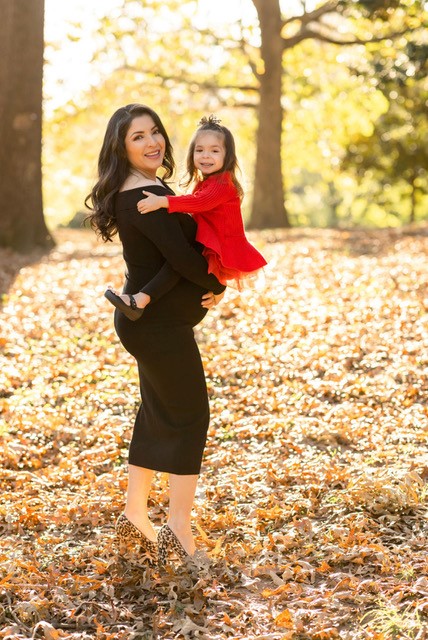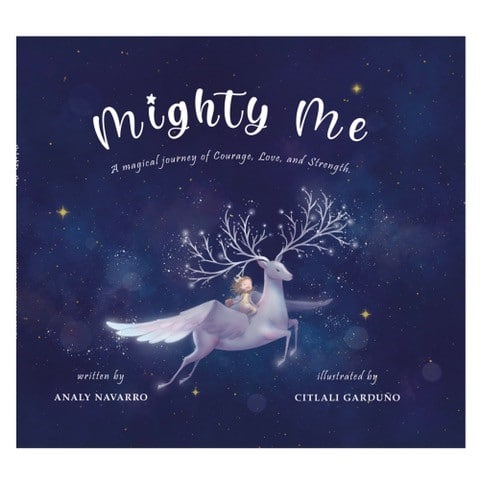Community
Mighty Me, The story of a second chance, love and how a transplant can change lives
Published
3 years agoon
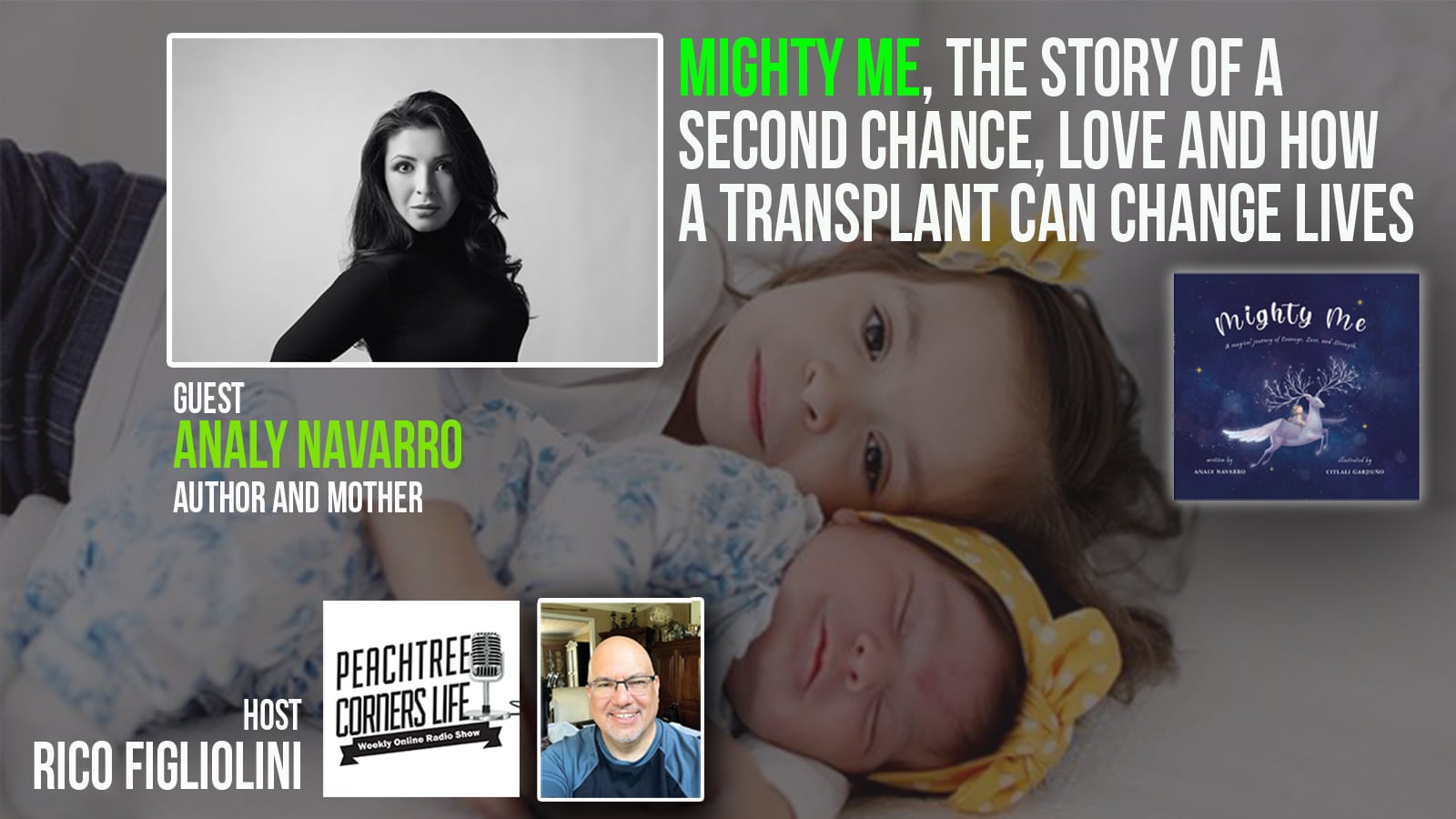
In this episode of Peachtree Corners Life, we hear from Analy Navarro, a mother, and author of the book “Mighty Me.” A resident of Peachtree Corners and first-time author, her new children’s book tells the story of how she became a living organ donor for her daughter.
Navarro became her daughter’s living donor in 2018 and allowed this transformative experience to guide her into a new career as an author, an advocate for organ donation, and a leader in raising awareness and funds for Biliary Atresia.
Listen in to hear Rico and Analy talk about the journey of this amazing family.
Resources:
Organ Donor Information: https://www.organdonor.gov
“Mighty Me” Book on Amazon: https://www.amazon.com/Mighty-Me-Magical-Journey-Strength/dp/057891896X
Analy’s Social Media: @the_a_navarro
Timestamp:
[00:00:30] – Intro
[00:02:17] – How Analy and Julia’s Journey Started
[00:05:20] – The Process of the Donation
[00:08:20] – The Importance of Organ Donations
[00:11:11] – Post Surgery and Family Support
[00:16:33] – The Idea Behind “Mighty Me”
[00:18:09] – New and Other Books
[00:20:42] – Funding Biliary Atresia Research
[00:22:31] – Where to Find Analy and The Book
[00:25:10] – Closing
“Thankfully the team that we had at Egleston and CHOA was amazing and they were able to educate us at every level about what the disease was about, what to expect, what the procedures were going to be, what our options were. And so we’re just so incredibly thankful with Children’s and everything that they’ve been able to do for us and for our family and give life back to our daughter.”
Analya Navarro
Angela Analy Navarro Mighty Me, children’s book
Podcast transcript
[00:00:30] Rico: Hi everyone. This is Rico Figliolini, host of Peachtree Corners Life. Today, we have a special guest, I’ll bring her on shortly. Our sponsor of the podcast and this family podcast is Peachtree Corners Magazine. Which is coming out. We just put that to the printer this week and we’ll have our issues hitting the mailboxes sometime next week, middle of next week I think. So check it out. It’s one of our biggest issues and we’re talking about holidays in Peachtree Corners along with a lot of other stories in there. But today’s podcast is an important podcast. It deals with a mother and author and her child. But let me start off a little bit with some stats that you all should be aware of. 106,868. That’s the number of men, women, and children on the national transplant list. According to the OrganDonor.gov site. Every year, certain amount get to have a transplant, but it’s a smaller number then what’s on the list. Last year alone, only 39,000 transplants were performed. That means that about 8 lives almost every day pass because there’s not enough living or past life donors to be able to help with the situation. Today’s guest is an author, a mother. She’s a mother first, became an author because of the journey she’s had. She’s a resident of Peachtree Corners and she is a first time author. And the journey she’s had with her daughter that inspired that book because the child had to have a transplant as well. And because there weren’t the right amount of people or actually the right person to donate or the right organ available, her mom became the living donor in 2018. And that inspired this book and our conversation today. So let me, bring her on, her name is Analy Navarro. Hey Analy, nice to have you on.
[00:02:16] Analy: Hi, thank you for having me.
[00:02:17] Rico: Sure. So tell us a little bit about the journey that you had with your daughter. And that must be tough because at some point, you were looking for donors. But then you had to make that decision because no donor organs were available that matched. Maybe not a tough decision for a mother, I don’t know. I’m a father of three kids and I think I would feel the same way. And I certainly would do what needed to be done to save my child. So tell us a little bit about what that journey was like for you and how that started.
[00:02:47] Analy: So our daughter, Julia she’s a first born and when she was almost four months old, she was diagnosed with Biliary Atresia. And that is a rare condition that about one in 10,000 babies are born with here in the US. What that meant is that she was inevitably going to need a liver transplant, and she was going to go into the waiting list. There is a procedure called a Kasai procedure that can be done to help elongate the life of the liver, the native liver. Unfortunately, my daughter was diagnosed too late to be able to qualify for that procedure. Our pediatrician initially missed it and she was diagnosed at almost four months. So at that point, having that Kasai procedure, it was only like a 25% success rate. And so we decided that it was best to just wait for a transplant. We ended up being listed and waiting on a transplant. And we were at the top of the waiting list for a child. Unfortunately, one didn’t come. And maybe not unfortunately, but just one didn’t come. Initially, when we were told that she was going to need a liver transplant we immediately asked, is that something that we ourselves can donate to her? And thankfully the liver is one of the few organs that you are able to be a living donor for. And so we went through the process and I was able to be her donor. It was a very extensive process to be able to qualify as a donor. And it happened here in Atlanta. So she was at Egleston and I was at Emory University Hospital. They collaborate and they are one of the few places in the country that are able to do living donors. And we are so fortunate to be here in Atlanta where that was possible.
[00:04:37] Rico: Wow. Unbelievable. That’s fortunate that you were able to be in the right place. It’s almost like God’s hands, put that there.
[00:04:44] Analy: Exactly. It was tough times, but we were at the right place and we were fortunate enough to be able to be at a place where they could do the procedure and where I could also be a living donor. And I was fortunate enough to be a match for her. They are many parents that have to end up waiting for an organ donor because neither a family member or themselves are able to donate for whatever reason. So they just have to sit there and wait. And that’s a very painful and just dreadful wait for you to just sit there and watch your child deteriorate.
[00:05:20] Rico: Now, most people may not understand this, a certain portion of your liver that was donated. Obviously not your whole liver cause yeah. So what is it? It’s like 25%? They find a portion of it that needs to be donated, right?
[00:05:34] Analy: Yeah. So for Julia, I had to undergo about, I think it was like a two, three day series of tests at Emory. Everything from blood work to scans. I mean, they look at everything. You have to be in optimal health in order to be a donor. And then aside from that, you also have to have the perfect liver. And like I said, it’s, it was a miracle that I was able to donate to her and that we were at a place where they could do it.
[00:06:00] Rico: Wow. So how long was the process from the point where you went under to the point where it was completed?
[00:06:07] Analy: So I went in at around five o’clock in the morning. Before I went to Emory, I went to CHOA, to Egleston to see her before the procedure. And I was able to give her a hug and a kiss, and then I walked across the street to Emory. And then from there on, I think it was about, I remember very little of it. It’s about an eight hour procedure for myself. And halfway through it, that’s when they brought her in and then they started to open her up and get her ready and get the native liver out in order to put my half in there or my portion.
[00:06:41] Rico: So that was 2018, that was three years ago. How old is your daughter now?
[00:06:45] Analy: She’s four. And her fourth anniversary is coming up in March the 26th. And every year we celebrate it as if it were her birthday, because it is a sort of rebirth.
[00:06:56] Rico: Is she aware of what happened? How aware is she of everything?
[00:07:02] Analy: Oh yeah, she knows the whole story. And that’s why the book was born. I wanted to make sure that she knew what she had been through. And I wanted her to feel empowered and own her story. So I want her to be able to share what she has journeyed through and understand the importance and how strong and mighty she is. At the time, she was only seven months old. But since I can remember, I’ve always told her that she has a small portion of mom in her belly. And that it was something that she braved through. And that’s how the book came about. I started telling her all these different stories. And I said, what’s a good way to present this to a child and to help her understand what it is that she’s been through at such a young age. And I was not able to find a book or anything that would, you know, that she could see herself in. So I went ahead and I decided, you know what, I’m going to write a book because she’s not the only child that has had a transplant and she’s not the only child that a parent needs to have this type of discussion with. And sometimes it’s not the child per se. It might be a brother, it might be a friend, it might be a grandparent that had to have a transplant. So this is a good way to present it to them and open that conversation and start that important dialogue about organ donation.
[00:08:20] Rico: It’s amazing. And the book is Mighty Me. Just bought that off Barnes and noble. So everyone should go out. We’ll have the link in the show notes and stuff. It’s a great book. Well-written, beautifully explained actually. Very well done. The artwork is phenomenal. So I think you have a great book there and a great story, obviously. So I’m glad that you were able to do this. Unfortunately, not every parent is able to do this, like you said. And it’s very difficult to find donors online and because of COVID. And you were fortunate also, that was the other thing, 2018 was pre COVID. So when COVID came about, living donors, that dropped. The amount of living donor donations dropped by far. And so there was a push to do donors after death. And that’s been, I think that’s actually been at the highest level, I think in 2020. Something like that, than ever before.
[00:09:07] Analy: The important point that you’re bringing up, because we are one of the happy stories when it comes to Biliary Atresia. Unfortunately, and it’s very heartbreaking, I’ve seen too many children pass away and die either one because they didn’t have a donor that came in on time. Or two, it’s such an aggressive disease that it’s hard to get them to the point. It’s such a fine line between being sick enough to qualify for a transplant and being healthy enough to be able to receive the transplant. And some centers might not have as much experience. And then, so we end up with parents going and traveling to other places to be able to receive a transplant as well. On top of the fact that some centers don’t actually do living donors. It’s so important to start building that awareness about how important it is to become a donor, but then also that there is the option to be a living donor. And as you pointed out at the beginning, there’s a long list of people waiting to receive an organ such as the liver. And many of those people on the waiting list are actually pediatric patients and tiny babies. Julia was only seven months old when she received her transplant. So there are babies waiting on different organs that sometimes we, we don’t think about because we don’t, when we think of somebody waiting on an organ, we picture an adult. We don’t picture a child or a newborn or a baby. But, you know, it’s important to keep that in mind and become aware that we are able to save people’s lives and leave a legacy behind. One that is of love and of life to a child or an adult.
[00:10:45] Rico: You have beautiful kids. I’ve just put the picture on so that people can see. Beautiful kids. Here’s another shot actually, and this is you and Julia
[00:10:55] Analy: Julia, yes. And I’ve gotten many questions from people wanting to be living donors. Especially women that have wanted to donate to a parent or to a sibling, and being pregnant and having a child after being an organ donor.
[00:11:11] Rico: And you’re a great advocate for it because you’ve been through the process. But let me take a step back also, because there’s dangers in everything that’s done in this world. Especially when it comes to transplants. Rejection of the organ donation and all that. So how long was your daughter actually under observation after the surgery was done?
[00:11:28] Analy: So she was there for about a week and a half, almost two weeks. She had some issues post transplant with her breathing. But it was because of her Biliary Atresia, she developed cirrhosis of the liver. So before she received the transplant, she was yellow. And I wish I would’ve sent you those pictures, but she was extremely yellow because her bilirubin level was extremely high. And so as soon as my portion of the liver went in, within a couple of hours, you could just see her looking so much healthier and her skin color completely changed. It was, it’s amazing to see.
[00:12:04] Rico: It’s a bit of a miracle to be able to see that. And especially everything that you’ve gone through. I imagine the family circled round and was supportive of everything?
[00:12:14] Analy: Oh yeah, for sure. My husband, he was amazing. I, I always say that I had the easiest portion in all of this because I was in the hospital. And he’s the one that had to send me out to be the donor and go under the knife. And then after that run to CHOA and take care of her daughter and then send her off. And I can’t even imagine what he was going through, waiting on me to be done with my part of the procedure. And for her to come out at the end and be well. For both of us to be well. And then take care of both of us at the same time, too. Thankfully like you pointed out, we have a strong support system and our families are here and they were able to take turns and watch me. And then also have him stay with her at the hospital too.
[00:13:03] Rico: Just because I know that, I don’t want to get into necessarily health insurance and all that. But was that, were you able to be covered by all that? Did the insurance cover your transplants and all that?
[00:13:15] Analy: Oh yeah, yes. Thankfully we had insurance. And if you are a living donor, the insurance coverage for the person that needs the liver or that needs the organ is the one that will cover you as well. Yeah, we had coverage and it’s, it was a lot that we had to go through. But thankfully we had everything. Everything just all the stars lined up.
[00:13:37] Rico: Yeah, definitely. The hospitals here being able to do it here, not having to travel, or being away for 2, 3, 4 weeks for the whole process to be done. That’s just, I could see how that could be a burden and stress.
[00:13:50] Analy: Oh, yeah, for sure. You know, you’re just so worried. You’re a parent and you know what it must have been like. Thankfully the team that we had at Egleston and CHOA was amazing and they were able to educate us at every level about what the disease was about, what to expect, what the procedures were going to be, what our options were. And so we’re just so incredibly thankful with children’s and everything that they’ve been able to do for us and for our family and give life back to our daughter.
[00:14:19] Rico: Yeah. And even the other side of that, being able to, for some families getting paid time off, maybe. Or being able to do that, to have the financial ability, the health insurance, to be able to do that. And the support system of family. Becomes very important at this point. Does your daughter still have to, I imagine your daughter still has to go back on a regular basis to be checked every once in a while, or?
[00:14:42] Analy: Yes, and I did as well. So she is at the point where she only goes back every six months. Just so they can you know, do some blood work and make sure that she’s doing fine. And thankfully she’s thriving and she is full of energy and life. She’s just amazing. And also initially for the first year, I want to say, I had to go back every so often as well. Because they wanted to make sure that my liver was regenerating and that everything was working correctly.
[00:15:10] Rico: Okay. And the idea is that the liver within your daughter’s body is going to regenerate also, I would imagine?
[00:15:16] Analy: Yeah, and grow with her.
[00:15:17] Rico: Yeah. So, and as far as the, was she having to take medications? Because sometimes with transplants, I guess you have to do that possibly?
[00:15:26] Analy: Yes. So initially she had to take seven different medications and now she’s down to one. And she takes an immunosuppressant that helps her system not attack the liver because obviously it’s not her native liver.
[00:15:40] Rico: Does she have to keep taking that?
[00:15:42] Analy: She has to take it, yeah. It’s a very insignificant almost, it’s like a little tiny droplet that she takes every day, twice a day. And it just makes sure that her immune system is at a certain level where they need it to be, to make sure that it doesn’t go into rejection because of the liver.
[00:15:58] Rico: Do you have to be a little bit more careful because of COVID?
[00:16:02] Analy: Yes. And now parents that are having their children get their transplant right now, I can’t even imagine. Because initially, the immunosuppressants that they take at the beginning of their transplant is a lot higher. And then they start dosing them down a little bit. So for us, we keep our circle very close and small. And it’s just basically family, a couple of friends that we know that are very still cautious. And it’s important for people to keep children in mind that are also immunocompromised. Cancer patients and, and everybody, when it comes to COVID as well
[00:16:33] Rico: Sure. So stepping back a little bit, when did the idea of Mighty Me the book come about? Was it before or after this? When did that thought hit you? That you should be an author of a book like this?
[00:16:44] Analy: Well, you know, I’ve always enjoyed reading and that was one of the things that I wanted to pass down to my children. And with Julia, I always bought her a lot of books and I wanted her to live many different lives. And I thought, what a great story her story is to help educate other children and to help other children see themselves as well. Not as victims of a disease or as victims of life that they’ve struggled with a disease, but more to feel empowered and be able to share that with their friends. I wanted her to have something to be able to take to school and say, look, this is my favorite book, and this is why it’s my favorite book. It’s about me. It’s about my own journey and I braved through this and that’s how it came to be. I wrote the story. In like a day, a day and a half maybe. And then the longest process was trying to find the right illustrator that had the look that I was going for. And that was going to be able to tell the story with the pictures the way I had envisioned it. And as you know, with children’s books it’s half the story and half the illustration. So if you don’t have both and the perfect marriage of both, the story might not be able to transmit everything that the author intended. And yeah. So that’s how it came to be. Eventually I found someone in another country that took me forever, but it’s been an amazing journey so far.
[00:18:09] Rico: She’s in Mexico, I think right? Is where she’s from. I mean, it’s just beautiful illustrative work. So you’re right. I think children’s books or any picture book really, lives on both the writing and the art work and it has to be captivating. And I think as anyone might look through this, they’ll see that. So it was very well done. Do you plan other books as well?
[00:18:29] Analy: Yes. Actually this book has had such an amazing, I received such an amazing reaction within the transplant community. Because as I said before, it’s nothing that we’ve had before. We didn’t have a way to open that dialogue with our children or their siblings and help them understand in a child way what a transplant was and what the journey was about. And so this has been so well received. I’m actually working on another two books right now and to tell the stories of, one is unfortunately the other side and the other end of children that end up not being able to get their transplant. So that’s such a hard thing to, to talk about with anyone, but especially children. And I felt that in my heart, it was something that I had to work on and do as well to bring that about. And it has to do with one of the characters in the book that’s in the Mighty Me book right now as well.
[00:19:24] Rico: That is a tough subject to be able to, I can’t even imagine doing that. You know, as far as owning that journey, transforming that journey, do you see a special mission for your daughter as well? As she gets older, does she participate with you? I mean, she’s only four. But I’m sure, these events that you go to and stuff maybe on this.
[00:19:43] Analy: Yes. She’s gone to a couple of the book signings that I’ve done. And we are also working on putting together a package to donate to the transplant floor at Children’s Healthcare of Atlanta. And so she’s very excited about that. She wants to sign all the books and write them a note and send them little drawings and say you’re strong. And I was like, Julia, that’s so kind. But it’s, I think it’s up to the families and the parents to educate their children on this and make them feel empowered by what they’ve been through. And help them understand that there are other little children that are also waiting and in a way, you’re an advocate for them. And you are an advocate for transplants and for Biliary Atresia. And not to give her a big burden to be able to do that, but just to make it into something that just comes with who she is as a person. And be able to, to be giving in kind and just be considerate and help share the stories of others based on her own story as well.
[00:20:42] Rico: Yeah, she has a strong story to tell. And a loving mother and family, obviously. To be able to go through all that. The fundraising work that you’re doing is through, mainly through the books, I imagine. And they’re available online. I think that, well I know I bought mine on I think it was Barnes and Noble or Amazon probably.
[00:20:59] Analy: Yeah. So you can find it on Amazon. And we’ve worked with Children’s Healthcare of Atlanta before, because they, it just happens too that they have one of the few research programs for Biliary Atresia. So Biliary Atresia is a disease that we don’t know much about yet. We don’t know what causes it. We don’t know how to prevent it. As I said before, the only forms of treatment that we have right now, are the Kasai procedure and a transplant. So we are working with them to be able to fund their research program. And before COVID we actually hosted an event, a fundraiser, and we donated a substantial amount to them through the event as well. And we hope to continue to work with them on this and help find a cure or a way to prevent BA. Because research to us is such an important aspect of a rare disease. You’re not only helping the community, which is something that we love to do as well, but you’re making a global impact. Because they are children in other countries, even here in CHOA. You know, you see people traveling from other countries to be able to bring their children here and have a transplant. So to us, that’s a way of us giving back, being able to help save other children as well. And give back as much as we can. And every holiday season, since Julia’s transplant, we try to hold a fundraiser. And before we had the book, we would donate blankets or toys and do like a toy drive, or a blanket drive. And this year, just to make it that much more meaningful, we want to donate our Mighty book to the transplant department, at CHOA too
[00:22:31] Rico: So while you’re on that, where would people go to besides Amazon, if people search on Amazon, they can find Mighty Me, by Navarro. That’s an easy enough search. Anywhere else that they can find the book?
[00:22:45] Analy: Just on Amazon right now. Hopefully next year, I’m trying to turn it into a hardcover and be able to bring the other books and create that much awareness and donate more too.
[00:22:56] Rico: And is there a website or social media that people can follow or visit to find out more?
[00:23:00] Analy: Sure, yeah. My Instagram account is DANavarro. And as you pointed out, my name is Analy Navarro. So you’ll be, you’ll find me pretty easily. I don’t think there are many of me yet.
[00:23:14] Rico: Yes, for sure. If people do Navarro, mighty Me, I think the book pops up like number one or something. And so portions of the book sales goes to the research.
[00:23:25] Analy: So the fundraiser that we’re doing right now is for every $25, we are donating two books to transplant children at Children’s Healthcare of Atlanta. And also we want to donate additional funds to the research program as well.
[00:23:39] Rico: Okay. And it’s important to be able to do that. There’s plenty of unfortunate diseases out there that don’t have advocates for them. They’re don’t even have, I guess they’re called orphan drugs where there’s not even treatments because there’s just not enough of a sickness out there for pharmaceutical companies to go and create treatments, to research treatment for them. So it’s great that you’re doing this. Obviously there’s a personal experience there and a personal reason for doing this, but you know, you’re the best advocate for that because of that. So I’m glad, one door opens, one door closes, one door closes, one door opens. So the, the idea of the transplant and the book that came about from that is just phenomenal. I was going to say, I’m sure, as you said, there’ll be more books coming, maybe even in other languages as well. That’s a possibility I would think.
[00:24:27] Analy: Yes. As you said, we are, we actually translated the book to Spanish already and looking into Portuguese. I had people from even the Netherlands and Spain and Portugal reach out to me that they ordered the book, they received it. And as I mentioned before is a very, it’s a one of a kind book when it comes to our transplant community. And it’s not just for livers. It’s also as you probably noticed, when you read the book, it doesn’t mention anything about an organ, or it doesn’t mention anything about a liver. It’s just the journey that this mighty little girl goes on to be able to save her own life. And so I wanted to make it as broad as possible so that any child could be able to see themselves in the journey, regardless of what they’ve gone through.
[00:25:10] Rico: Yeah, no, I think the idea of searching, I don’t want to give spoiler alert. But searching for this stone I think it was a good, obviously a good analogy of what, this little girl in the book goes through. So yeah, it’s, I think anyone that’s looking at transplants. Anything quite frankly, hope in something. That journey to be able to find hope and resolve is important. So I would encourage people to go out and search Mighty Me. Find the book online. If you have questions for Analy Navarro, you can find her through the social media that she mentioned. Probably comment and message her on Instagram. Do you want to give us any more thoughts that you want to leave us with, Analy?
[00:25:50] Analy: Yes. I do want to say that you know, sometimes as a parent and especially as a first time parent, you are dealt some cards that sometimes you don’t anticipate. You think about having this perfect little baby, that’s going to be healthy and strong and ou r baby was perfect and strong. Unfortunately she wasn’t healthy. And we had to journey through this very complicated road and there was no roadmap to. So if you find yourself being at the beginning of a complicated journey, just know that it’s important for you to choose what it is that you’re going to make out of the journey and how you want it to end up. I know sometimes a lot of things are out of your control, but if you just trust and become positive and just think positively. And know that your child feeds off of your energy and that as a parent it is important for you to be their rock. To be able to be their powerhouse and feed them that energy and just make the most out of it. And obviously, if you’re not an organ donor, please consider one because you are able to save many lives and you can even do it while you are still living. There are many children, as we said before, waiting on a transplant. And it’s a painful wait for the parent and for the child as well. So you have the power within you to give life to others and to be able to save them and leave a great legacy of love and life behind.
[00:27:15] Rico: Great. Perfect. Thank you Analy for spending some time with us and telling us about your story and your book. Everyone, it’s a great little book. I think you should pick it up, Mighty Me. Find it on Amazon. And if you have questions about the journey or you have your own journey that you want to ask questions about, I’m sure Analy Navarro will be more than willing to answer those questions. So find her social media link in our show notes or search for Navarro, Mighty Me. And you’ll find where she is.
[00:27:43] Analy: Thank you so much. Thank you for having me here. And as you said, you can find me on Facebook or Instagram, and I’ll be more than happy to share more questions or answer your questions too.
[00:27:52] Rico: Excellent. Thanks again. Bye.
Related
Community
Peachtree Corners Shines Bright with Light Up the Corners Glow Race this August
Published
2 days agoon
July 24, 2024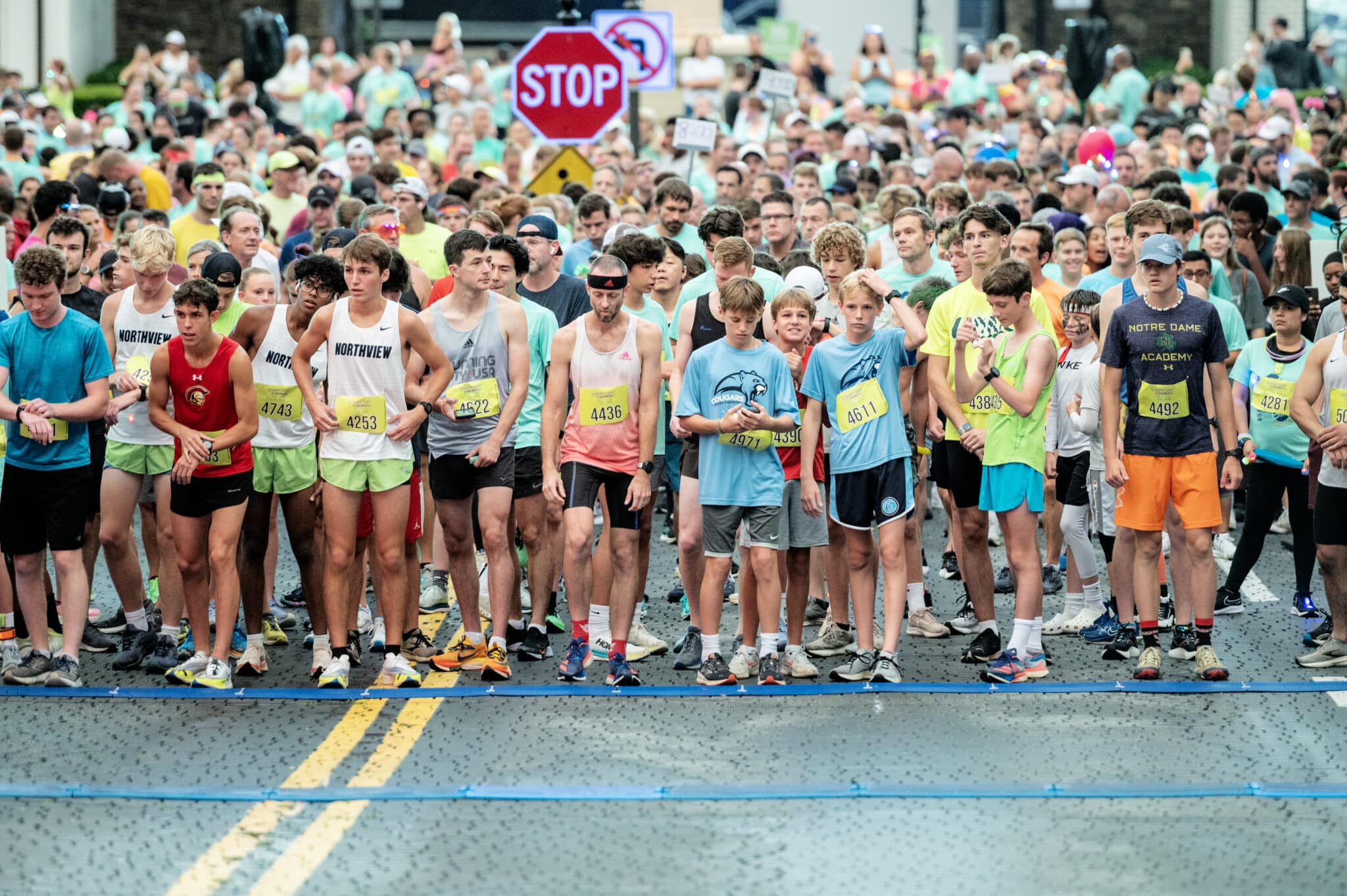
Peachtree Corners’ annual Light Up the Corners Twilight Trot and Glow Race is returning to the Forum on Aug. 10 for its 13th year of building community, getting some exercise and benefitting a very worthy cause.
Amy Massey, the founder of Light Up the Corners, said her inspiration for the nonprofit came from serving on the board of the Fowler YMCA for 10 years.
“I was always looking for ways to raise money for [Fowler YMCA’s] annual campaign. And I rotated off about 12 years ago or 13 years ago. At that time, I was looking for ways to raise money, and the City of Peachtree Corners was talking about becoming a city through UPCCA,” she explained.
“I’m a runner and I was a member of the Y, and we had a running group out of the Y. So, I just recruited some of my running friends and decided we would start a race in Peachtree Corners,” Massey added.
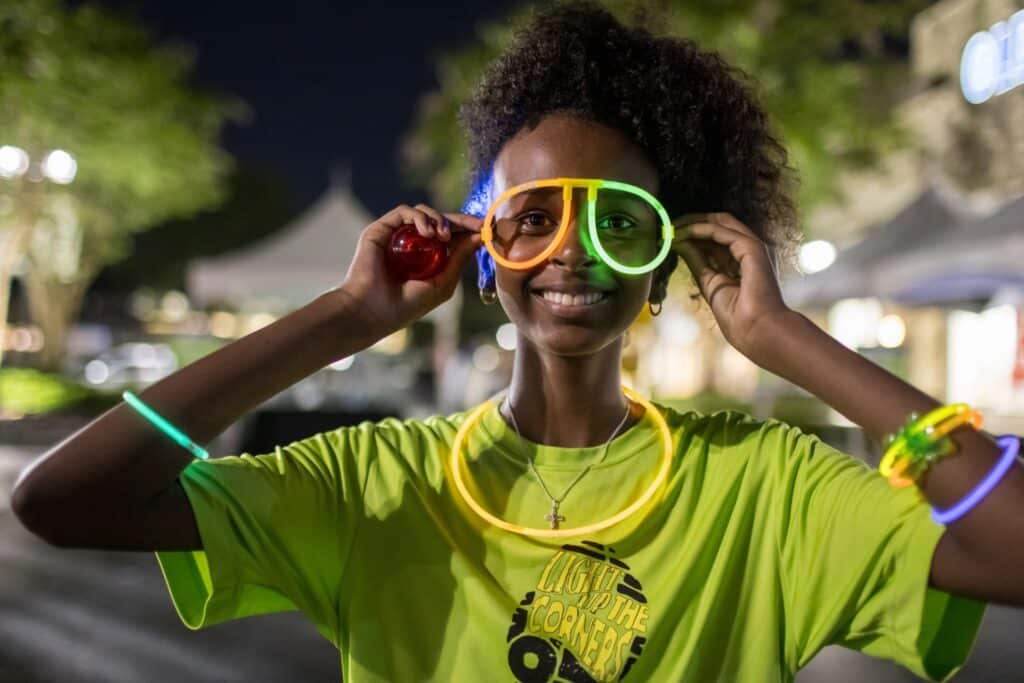
Bigger and better
In its first year, the race had roughly 400 participants. Not a bad turnout for the inaugural event, but Massey and her team of volunteers quickly started brainstorming on how to attract more runners.
“We talked about doing a glow run, and that’s when it changed. So, in year two, we did our first glow run. This year will be our 11th annual glow run and our 12th run altogether. And then we took one year off during COVID,” said Massey.
It’s my baby,” she added. “But I could not do it without the help of my friends and running partners who have been with me all the way. We have some of the same volunteers on our committee now as we did when we started out.”
This year, Light Up the Corners expects over 1,500 attendees.
“There are a lot of glow runs out there that are more of adult-focused parties. But ours truly is a coming together of people of all ages and all walks of life,” said Massey.
“That’s what sets us apart because our largest demographic in terms of age groups is the 10 to 19 range. A lot of school-age kids come out, a lot of young kids with their parents. We have 300 little kids who sign up for the Twilight Trot, which is just half a mile long. And so that attracts the little ones. It’s heartwarming to see people of all ages come together and it’s a healthy fitness-focused, family-friendly community activity,” she added.
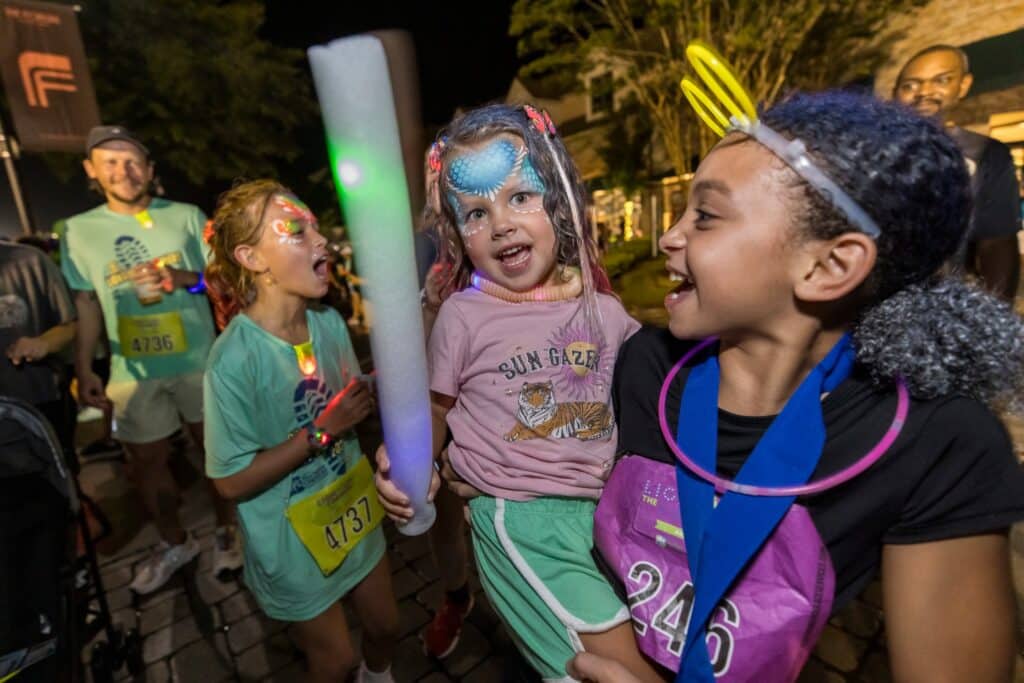
A big, family-friendly party
In addition to two races: a Twilight Trot 1K for the kids, and a 4-mile Glow Race for the adults, the Forum will be showcasing its new plazas. The pre-party and Glow after party will be held on the Grand Plaza which is set to open on that very weekend.
“Each participant gets a lot of glow swag, we want to make sure everybody lights up the course as they’re running around Peachtree Corners, and also to keep them safe so everyone gets that and a glow baton,” explained Massey.
“We welcome runners, walkers and people of all ages. It is more about the fun and the excitement of coming together as a community than it is about racing or setting any speed records,” she added.
The Forum has also hired Yvonne Monet, a radio personality and DJ with Q99.7, to entertain eventgoers and keep the energy up with great music. There will also be face painting and neon fingernail painting, along with roaming entertainers on roller skates and more, courtesy of the Forum.
On top of that, race sponsors will be providing food and samples throughout the night, like pizza, watermelon and a wide variety of other tastings from The Forum restaurants.
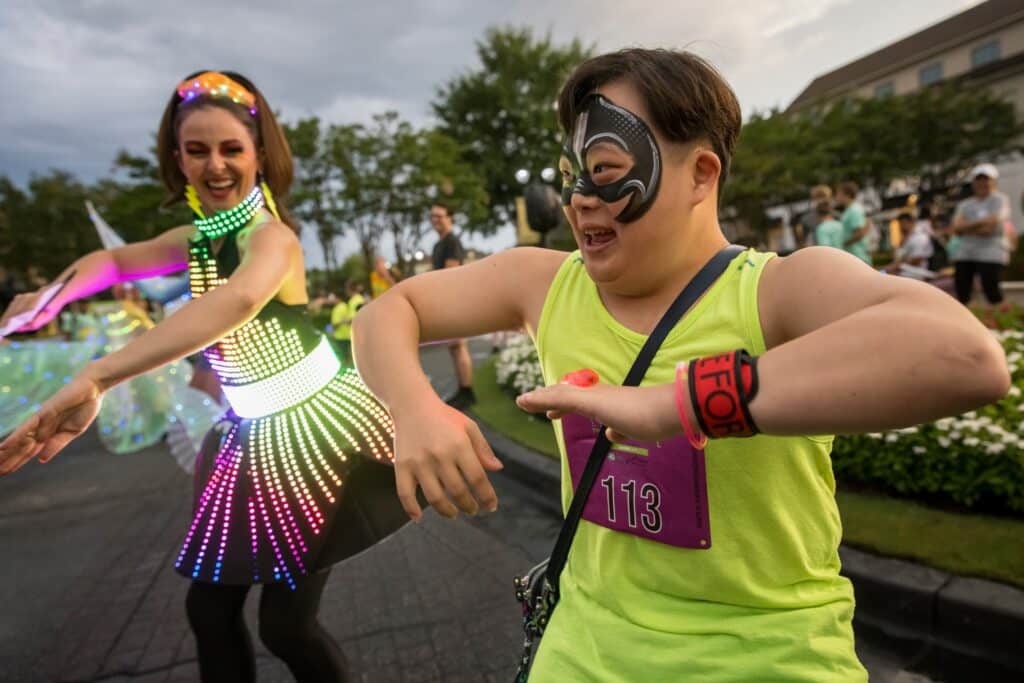
Coming together for a worthwhile cause
Light Up the Corners is an IRS-recognized 501(c)(3) nonprofit run entirely by volunteers. There are no paid positions at all, and 100% of proceeds go to the Why it Matters Campaign at the Fowler Y.
“All money stays local, and it is a passion of our committee to help the Y through this campaign. We believe that all people, regardless of their ability to pay, deserve to benefit from the programs and services at the YMCA. And they have a sliding scale that they use to provide financial assistance to people,” said Massey.
“There’s a wide range of programs and services, and I’ve seen firsthand the work that they do there and the life-changing effects that it has had on so many people in our community,” she added.
Sponsors are also fundamental to the event’s success.
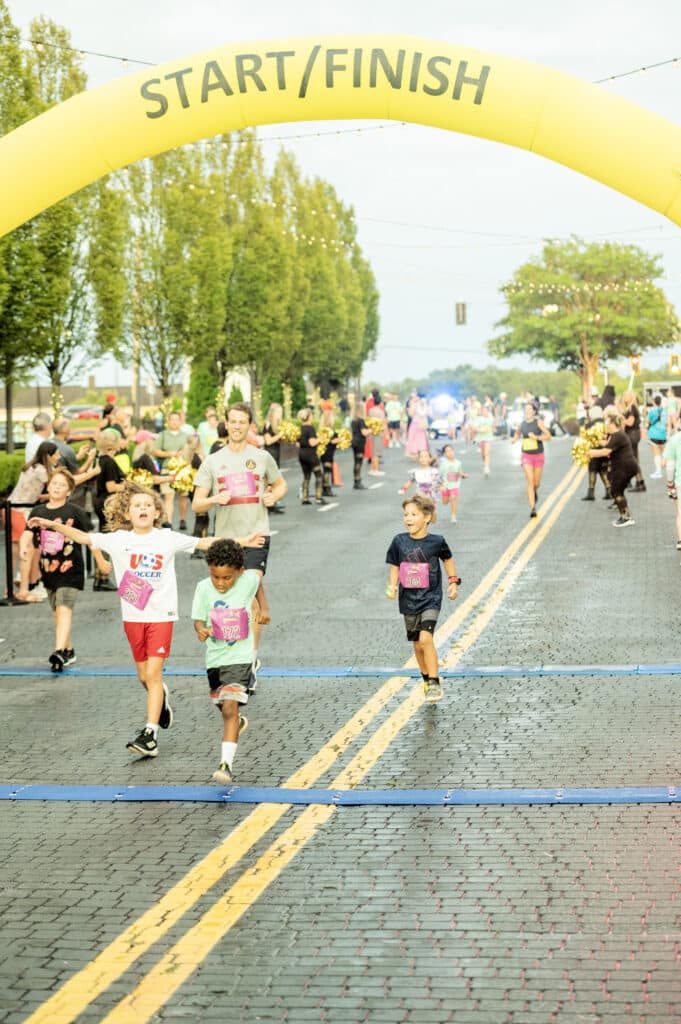
Without the support of sponsorships and generous donations, there would likely not even be a race because the associated costs would cancel out the registration fees, explained Massey. Sponsors allow Light Up the Corners to offset all costs of the event so that 100% of registration fees by individuals go directly to the YMCA.
“I will say that North American Properties, when acquired The Forum, have gotten behind this event 110%. They have been amazing in their support and generosity in providing the tents, the entertainment and the backbreaking work of setting up something like this,” said Massey. “We couldn’t do it without them or the City of Peachtree Corners which has been a title sponsor since day one.”
Fun fact: For the first time, Light Up the Corners held an open competition to see who in the community could design the best t-shirt logo for this year’s race. Daniel Lee was chosen out of over 30 submissions and was awarded $1,000 for his efforts.
To participate in the annual Light Up the Corners Glow Run, register at lightupthecorners.com or simply line up on the racecourse and cheer the runners on as a spectator. To become one of over 200 volunteers, email Amy Massey at amassey@runthecorners.com.
Related
Community
Twin Authors Chronicle Antics of ‘Four-Legged Brother’
Published
2 months agoon
June 6, 2024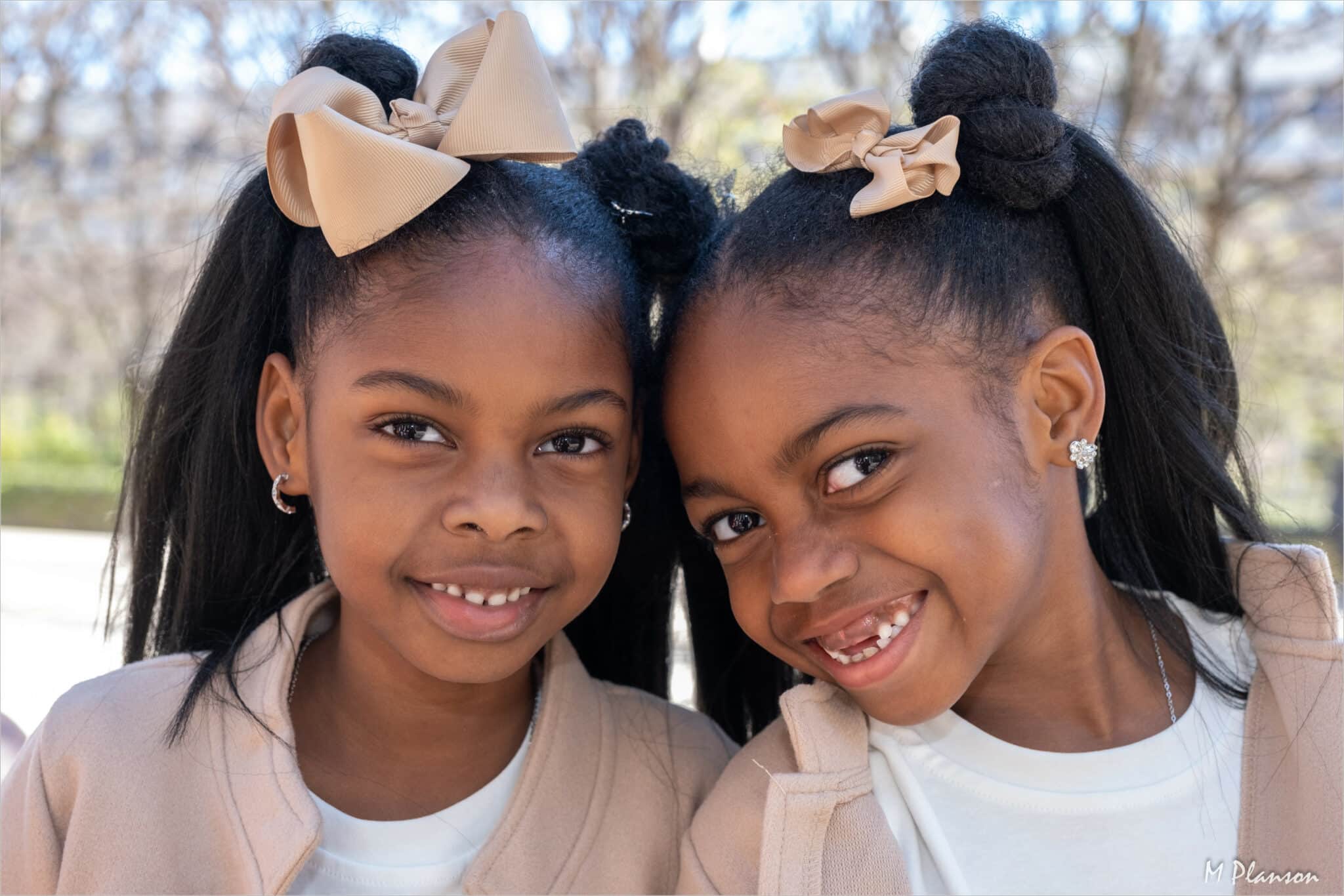
Berkeley Lake second graders make fans across the globe with sweet children’s story.
When rescue dog Apollo found his forever home with Megan and Mackenzie Grant, the Berkeley Lake twins knew they had added a special member to the family. He’s so beloved that he’s considered their “four-legged brother.”
Apollo is a Boston terrier. The breed is known for its friendliness and love of people and children. According to the Purina Company, makers of all kinds of pet food, Boston terriers make affectionate pets and are outgoing and social.
While they are called ‘terriers,’ they are not in the terrier group, nor do they behave like them. They are far happier at home with their owner than getting into the usual mischief.
But Megan and Mackenzie see him as a silly addition to the family.
“He’s super cool because he’s always up for fun and loves us a whole bunch. And guess what? We love him back even more! He’s like the best friend ever, wagging his tail and making everything awesome!” they said in a press release.
Apollo’s birthday inspiration
As his first birthday approached, the girls, six years old at the time, wanted his day to be special.
“I said, ‘Well if you want to come up with something to do, let’s write it out,’” said mom Tameka Womack. “So they started writing out all these different adventures, and it was so cute.”
Megan recalled that their teacher had told them about someone who had published a book, and she asked if they could, too.
“When I read through it, they had all the different things, like playing dress up because we had bought some clothes for him. And we take them out for long walks around the lake and stuff,” Womack added.
Although their favorite subjects in school are PE and art, they did such a good job with the tale that Tameka worked with them to get it published. On Feb. 1, the young authors released the children’s book, “How We Love Our Four-Legged Brother.”
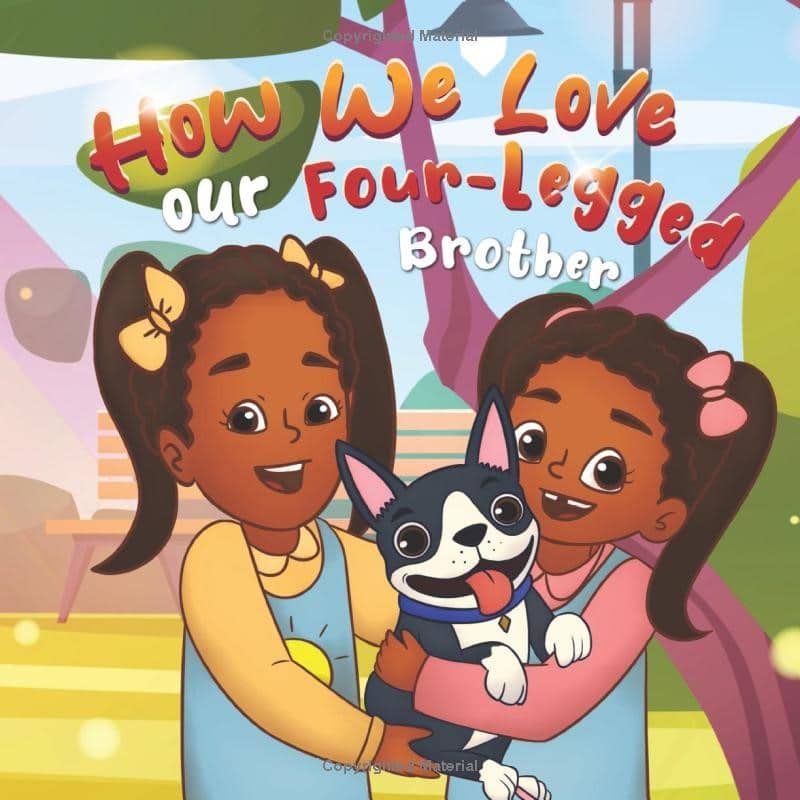
Publishing success
The 30-page book took off almost immediately. Available for print and digital through Amazon and print editions through Barnes & Noble, the book has reached customers in the U.K., Germany, France, Japan, Canada, Australia, Sweden, the Netherlands, Italy, Poland and throughout the U.S.
The girls and their mom were so pleased and surprised to find out the book was No. 1 in its category on Amazon.
“They were just so excited that people actually bought the book,” said Womack. “They were just like, ‘Wow, who is buying this?’”
Feedback from fellow twins, animal lovers and teachers showed that the story resonated on many levels.
“As an educator, I am always on the lookout for diverse and inclusive literature for my students. ‘How We Love Our Four-Legged Brother’ not only captivated the imaginations of the children in my class but also served as a wonderful conversation starter about friendship, empathy and the beauty of diversity,” wrote Ashleigh Darby.
The royalties from book sales are tucked away, with a percentage going to Apollo’s wardrobe.
“He won’t go out in the rain without his raincoat … or out in the winter without his sweater,” said Womack. “We have a little budget for his clothes because every time the girls see something, they’re like, ‘Oh, I think Apollo will like it.’ I’m like, I think he would too, but let’s let it stay in the store.”
Nurturing creativity
Although both mom and dad are engineers and kind of hoped that the twins would follow in their footsteps, Womack said she’s okay with them being artistic and creative.
“Writing is teaching them some responsibility and teaching them a little bit about money,” she said. “Now they want to write a book every day.”
Between raising three daughters (the twins have an older teenage sister), running a household with her husband and keeping up with her career at Georgia Tech, Womack said she’ll look for time to continue helping the girls with their dreams.
“With summer coming up, I would definitely encourage parents to help their children explore their creativity in any kind of way, from digging holes in the ground to … seeing the world … to creating books instead of being on the internet,” said Womack. I try to limit my kids’ screen time … and build real memories.”
Find “How We Love Our Four-Legged Brother” on Amazon.
Related
Community
Local State Reps Give Roundup of Legislative Session
Published
2 months agoon
May 28, 2024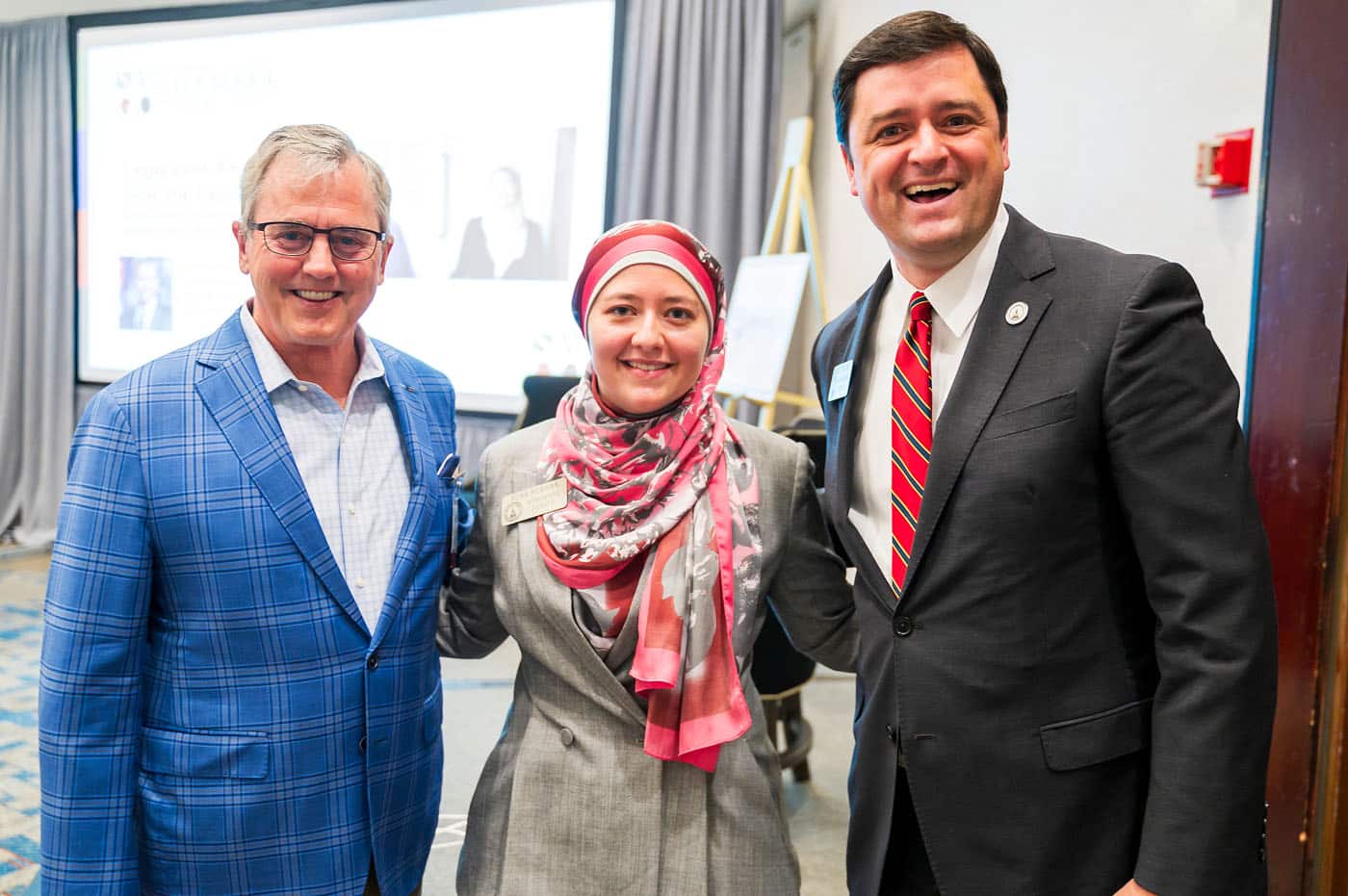
Hilton, Romman trade friendly banter that reflects diverse views in Georgia government
Georgia State House District 97 Representative Ruwa Romman and District 48 Representative Scott Hilton, whose constituents include parts of Southwest Gwinnett County, including Peachtree Corners, sat down for a second time to share information about legislative action at the State Capital.
Their discussion was part of the Southwest Gwinnett Chamber of Commerce First Friday Breakfast series at Atlanta Hilton Northeast.
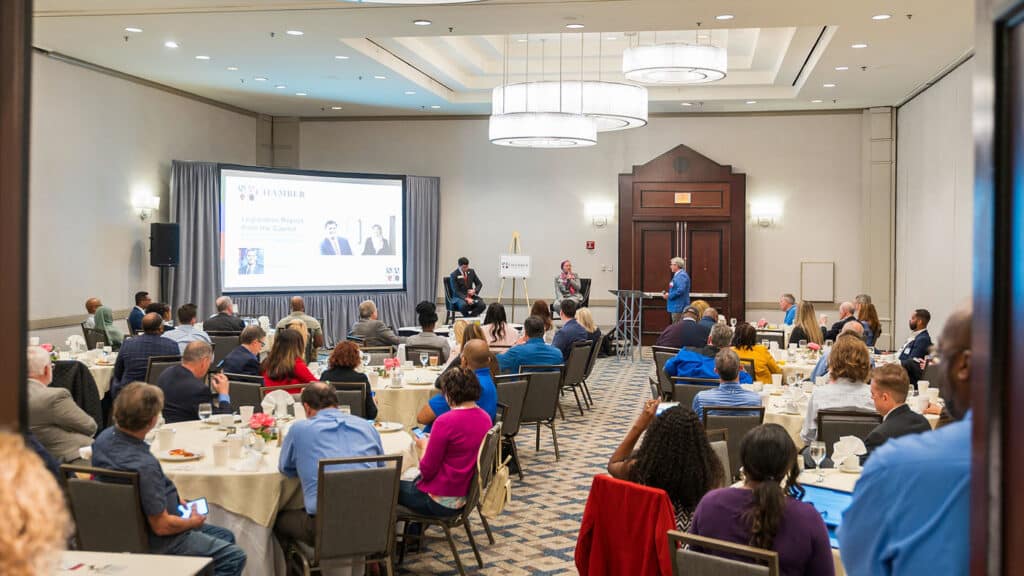
Although they sit on opposite sides of the aisle, Hilton and Romman both seek to sponsor and pass legislation that improves and maintains a high quality of life in the Peach State and provides its residents with what they need.
Elected in 2022, this was Romman’s sophomore year in the State House. She serves on the Georgia House Energy, Utilities and Telecommunications Committee, Georgia House Information and Audits Committee and Georgia House Interstate Cooperation Committee.
Hilton previously served in the State House from 2017 to 2019 but took a “sabbatical,” as he calls it, to serve as executive director for the Georgians First Commission under the Office of Governor Brian Kemp.
He was re-elected to his current position in 2022. He is the vice chair of the Georgia House Creative Arts and Entertainment Committee and the Georgia House Education Committee, as well as a member of the Georgia House Public Health Committee and the Committee on Georgia House Urban Affairs.
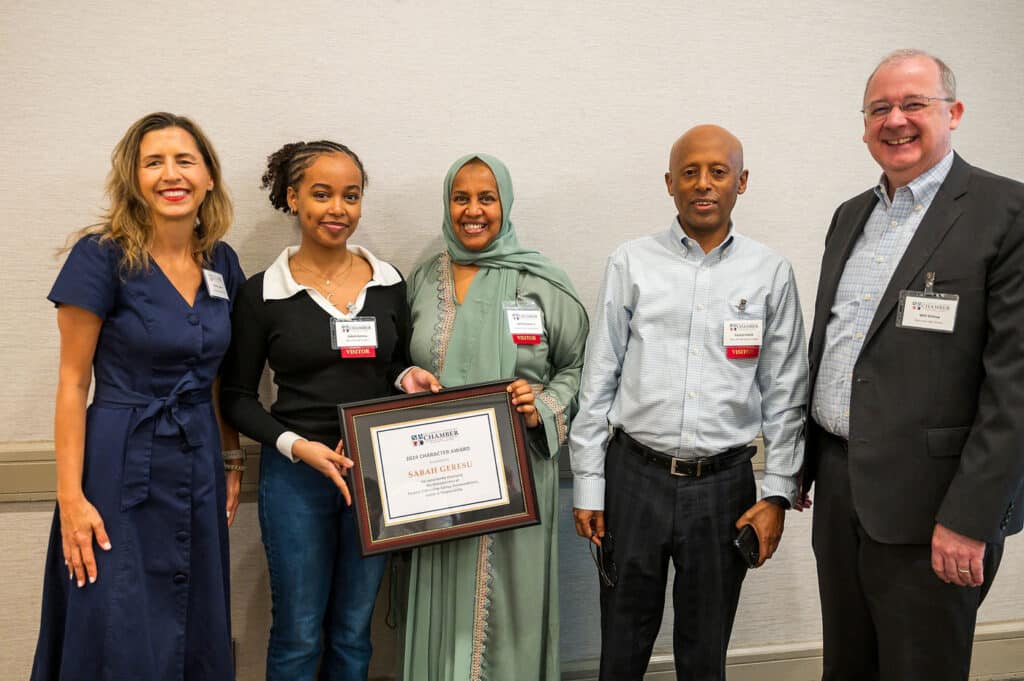
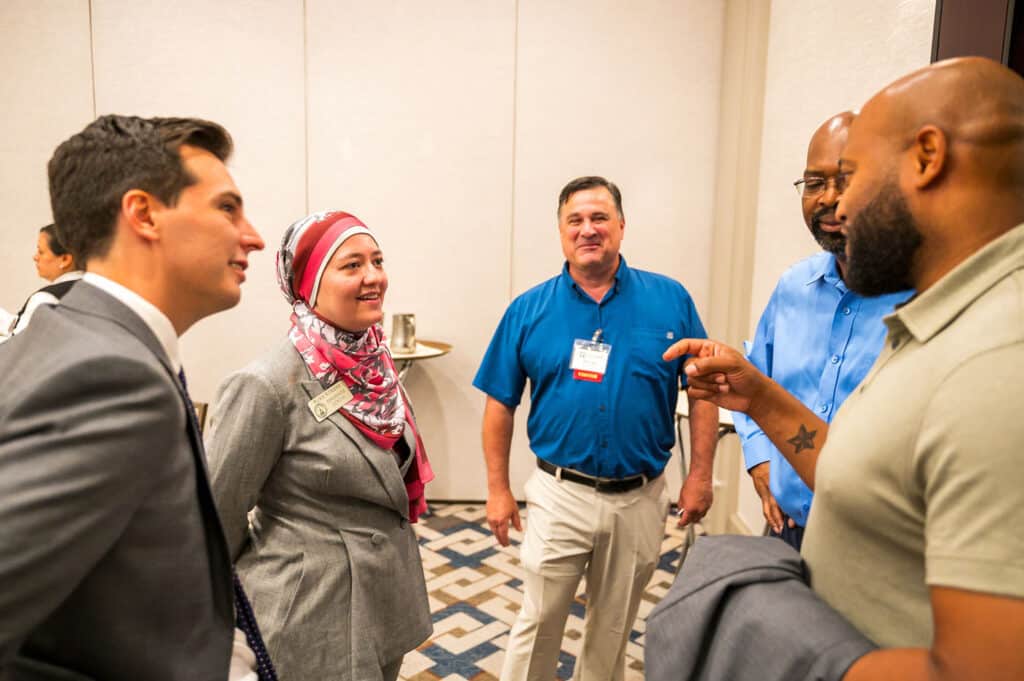
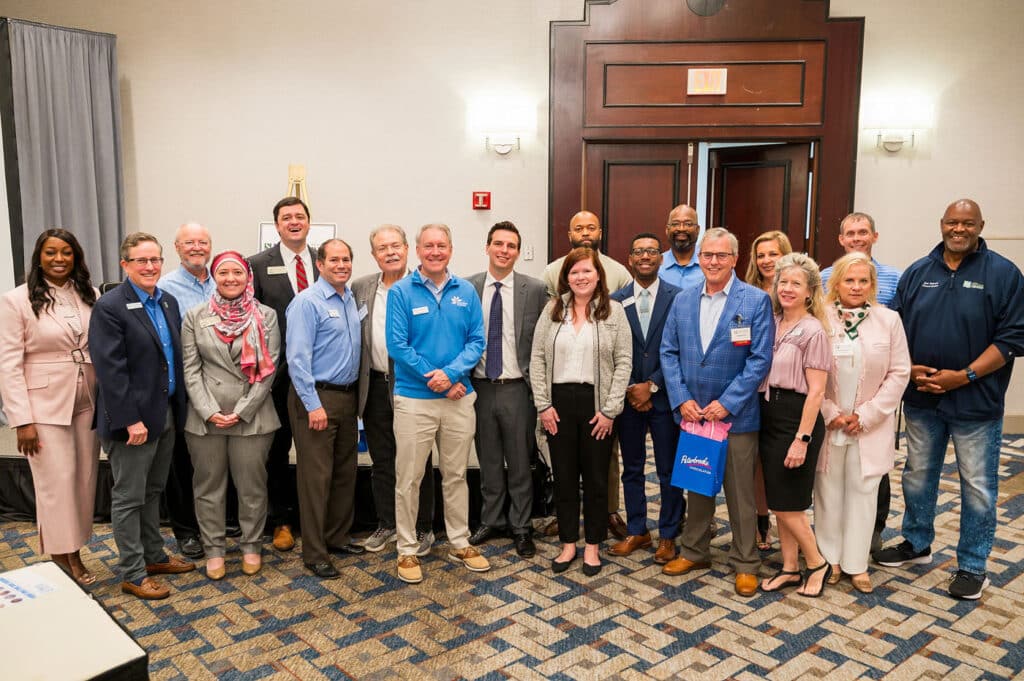
Senate Bill 63
The moderator, Norcross resident and former WAGA political reporter Dale Russell started off with a topic making headlines: Senate Bill 63. This law, signed by Gov. Kemp shortly after the session ended, prohibits charities, individuals or groups from providing bail funds for more than three people per year unless they register as bonding agencies. It also expands mandatory cash bail to 30 new offenses.
“I think it’s going to bring home safety to the community,” said Hilton. “I ran on that issue because as I was knocking on doors, I’ve heard from folks who [want to] keep our community safe. And unfortunately, no community has been immune from the uptick in crime that we had seen post-COVID, so this was one of those bills in response to that.”
Hilton gave examples of crimes where individuals out on bail committed acts such as murder.
“That was our commitment back to our constituents to say, ‘Listen, we’re not going to let bad guys back out onto the streets again to do more crime.’ This bill was in response to this; it’s going to keep our community safe, hold those accountable and bring justice to those who break the law,” Hilton remarked.
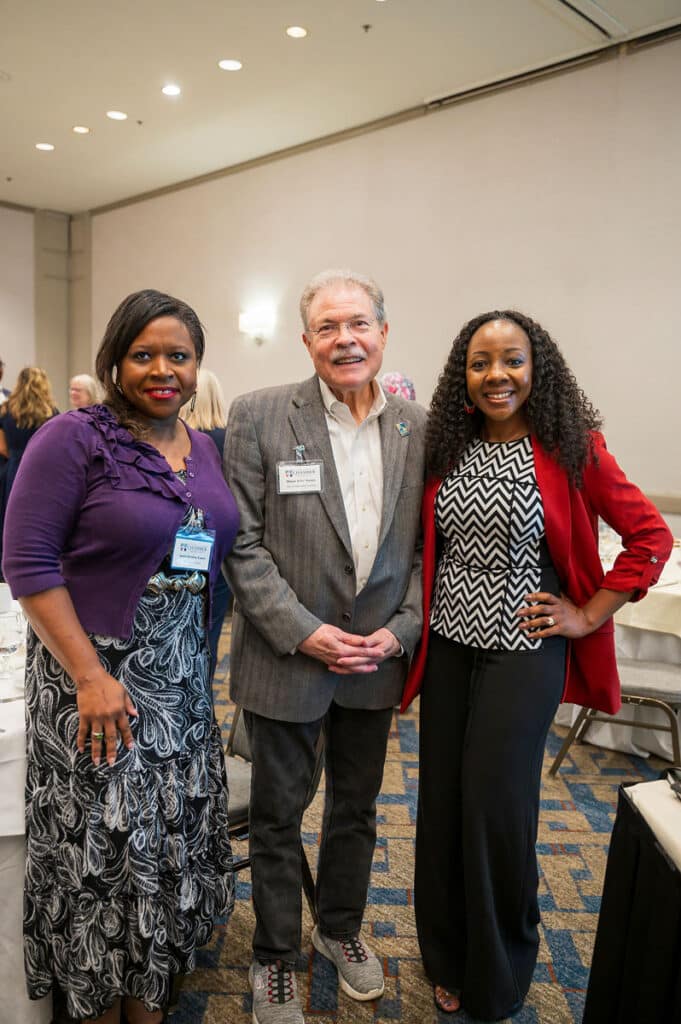
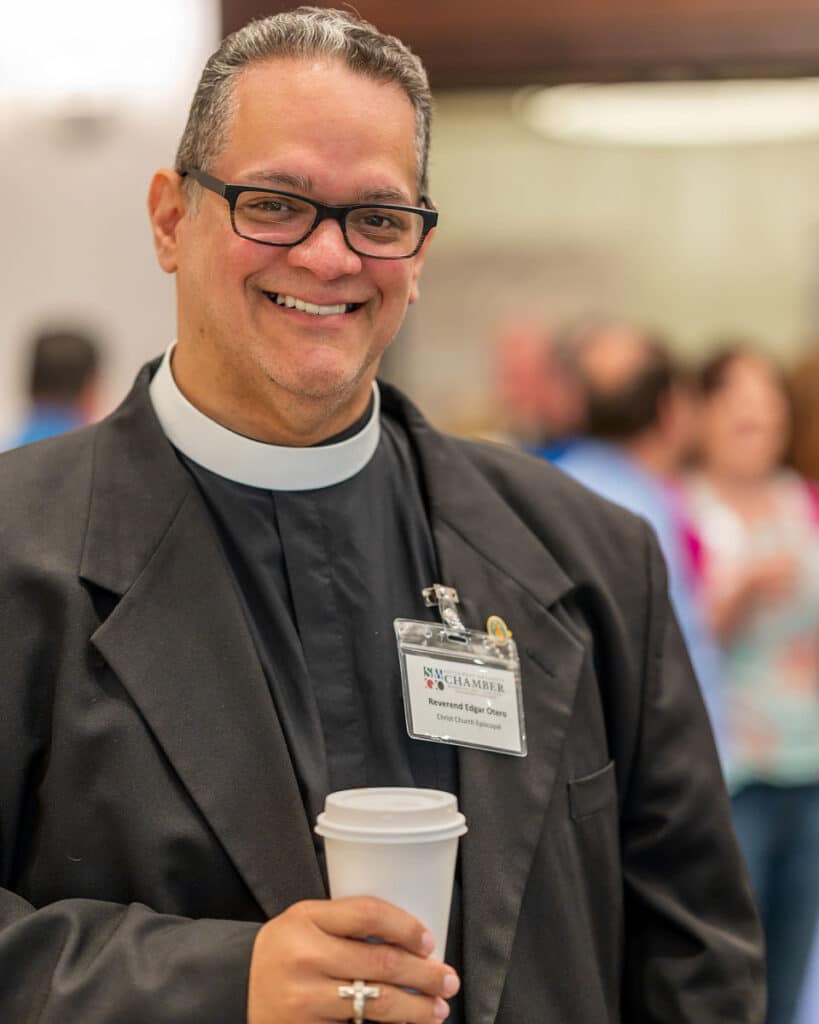
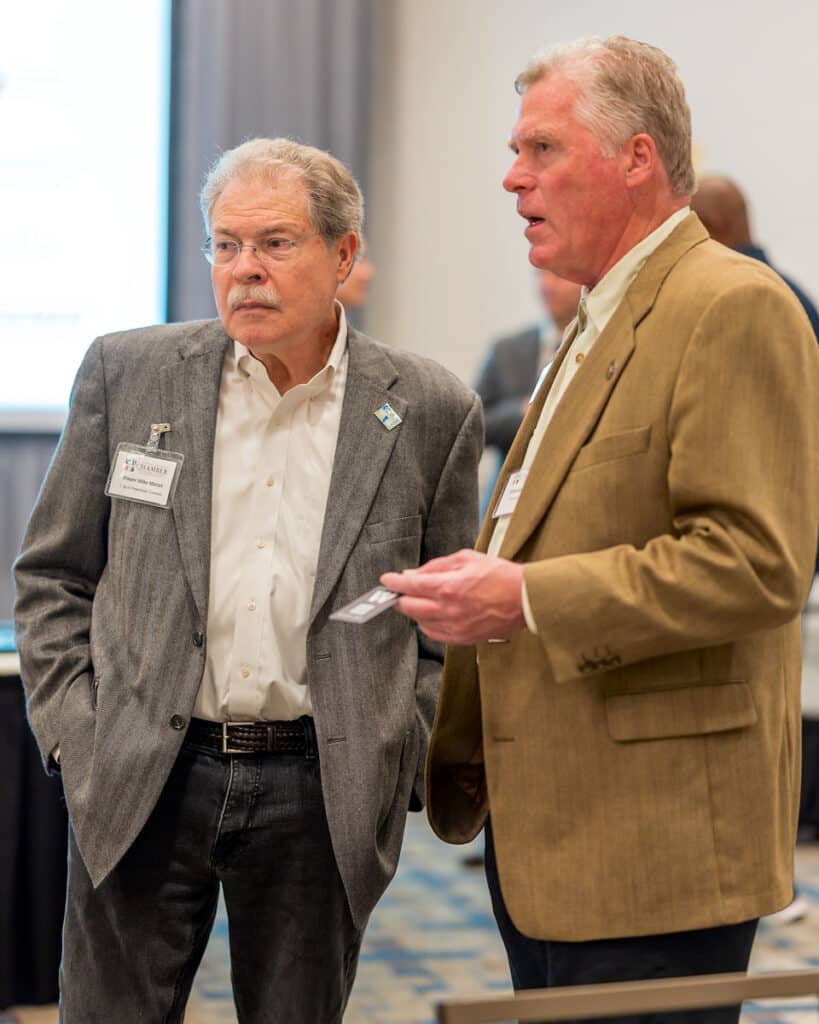
“Unfortunately, right now, we’ve got district attorneys and sheriffs across Georgia who are blatantly disregarding the law and letting folks back out on the streets who pose, you know, safety risks to law-abiding citizens like you and I and your businesses,” he continued.
Russel pointed out that there’s been a lot of criticism of this law.
“The ACLU was totally against it. Some felt like it was imprisoning poor people in the sense, for minor crimes,” he said.
“I do agree with the criticism for a few reasons,” said Romman.
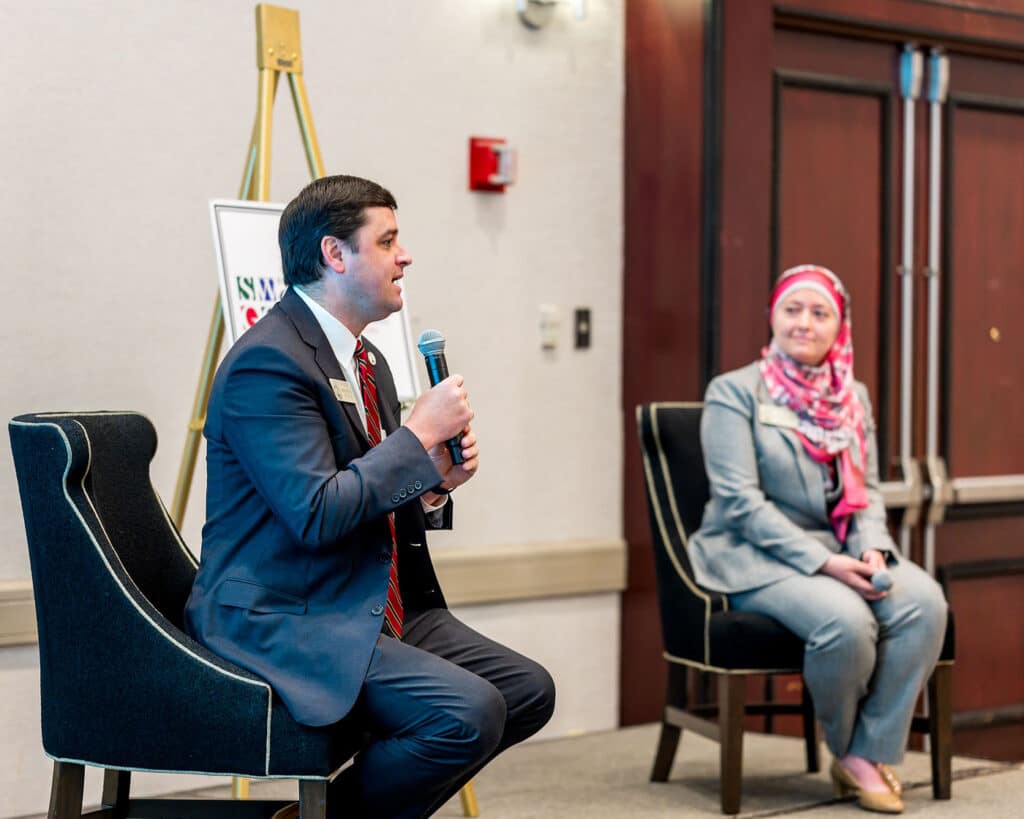
“The problem with this bill is that of the 30 crimes that are listed as now requiring a cash bail, the majority of them don’t actually require jail time, even if you’re found guilty of them. So now, somebody who would not even have ever served time for those crimes that are listed could now serve jail time because they cannot afford their bail,” she explained.
She added that the law doesn’t address the crimes it’s supposed to protect citizens from.
“We see these headlines, but this bill doesn’t address those because what we see happening is that a lot of churches now will no longer be able to bail people out that cannot afford their bail because of this bill,” she said.
“And churches that have been trying to, for example, reunite a parent with their children for Christmas, or whatever the case may be, can no longer do that. There is actually an exception written into this bill for bail bondsmen. So, it’s not like being able to pay cash bail is completely out of the question. It just means that somebody can make money off of it now,” Romman continued.
Hilton said the state isn’t done with addressing public safety issues as they come up.
“I know that’s been a priority of the governor, and I think rightfully so; you know, there’s a reason we’ve got citizens flocking to Georgia over the last ten years; we’ve added a million Georgians to our state, and they are leaving states with policies that don’t have this. They’re coming to Georgia for economic prosperity, for safety and for good schools,” said Hilton.
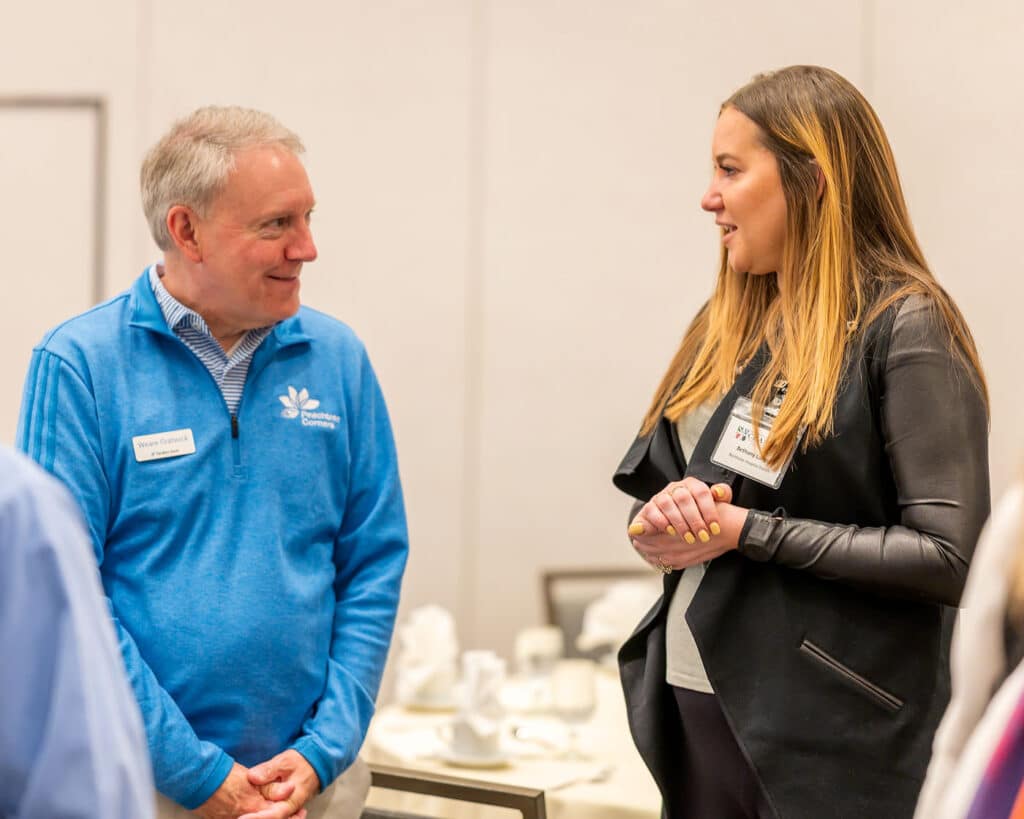
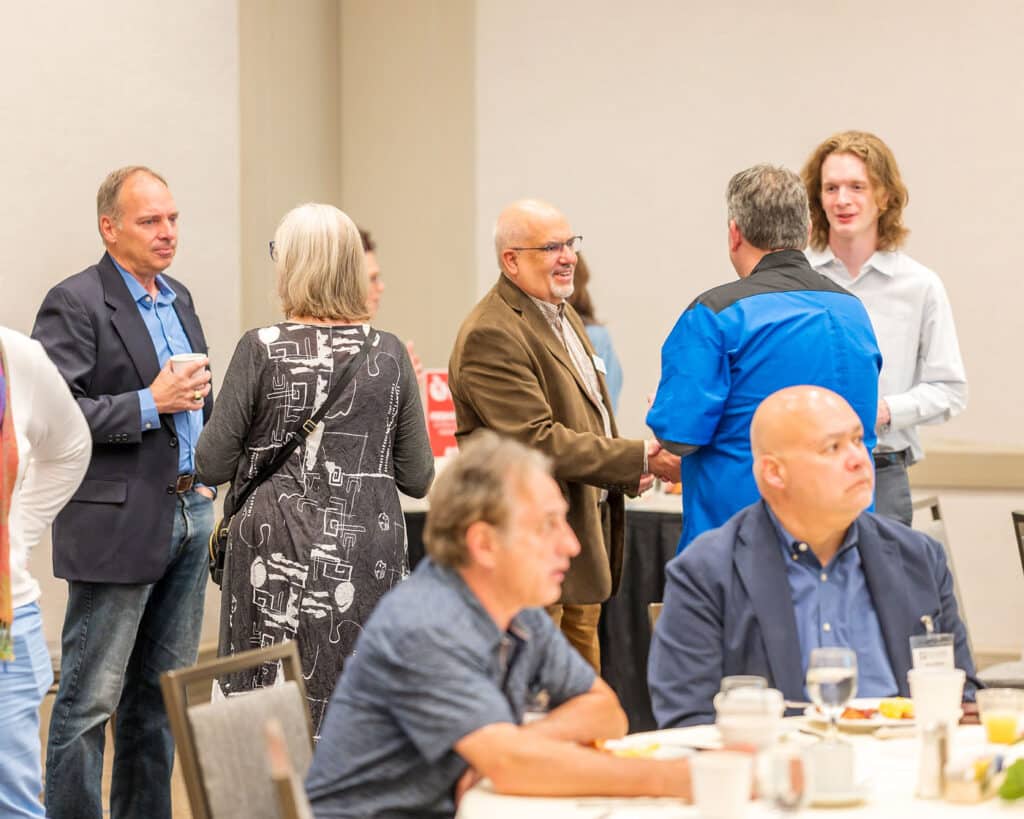
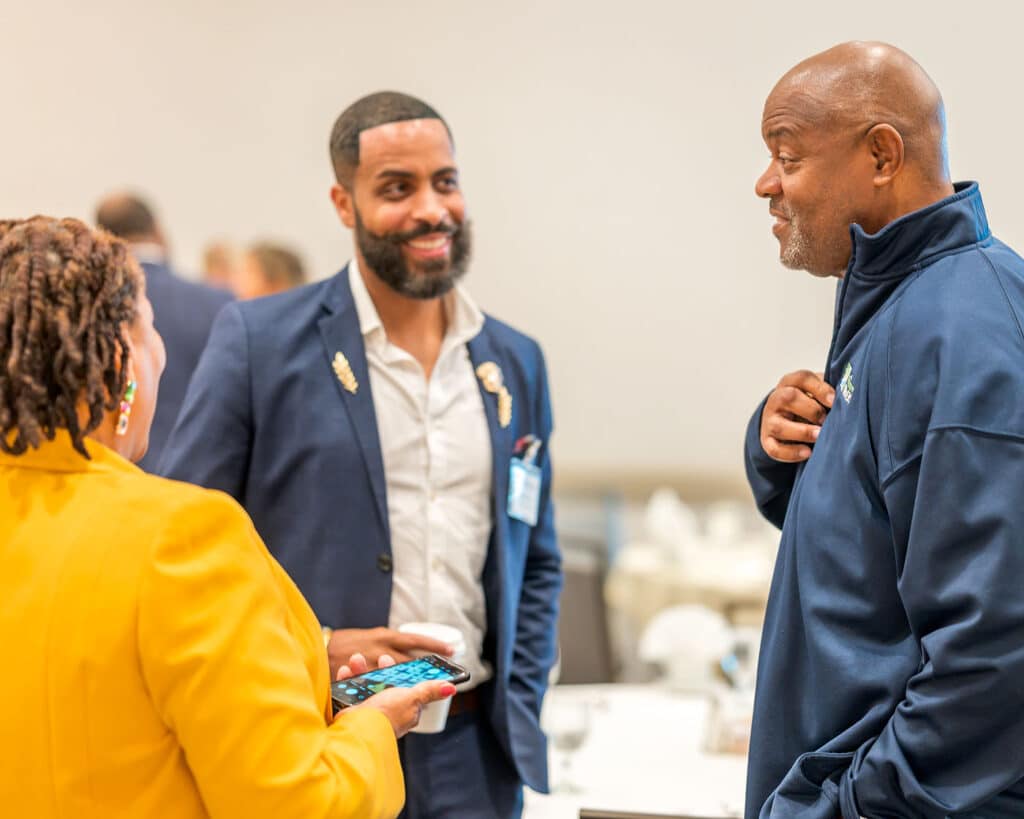
House Bill 1105
Another controversial bill, HB 1105, is framed as a public safety bill that requires local enforcement to coordinate with federal immigration officials when someone in custody is suspected of being in the country illegally.
Some say it’s an immigration bill.
“I know that the federal administration is trying to tell us there’s not a crisis. But there is a humanitarian crisis going on right now on our southern border. … But they’re not handling it the right way, and it’s starting to impact our communities,” said Hilton.
“We’ve got sheriffs who have folks in their custody, who [need] to be reported up to ICE. And essentially, they’re sort of ignoring what’s in the law right now that says you got to report these folks,” he explained.
Romman doesn’t see it that way.
“Again, when you read the contents of the bill, that is, unfortunately, not what it does,” she said. “I’m one of the few, if not the only, member of the legislature that’s done any border project work,” she remarked.
She talked about her work keeping unaccompanied immigrant minors safe.
“I want to remind people that when we talk about immigration, there’s an entire spectrum of people that we are talking about. And it’s not just at the border, it’s also people that fly into our country legally, that gets narrowed into a terrible immigration system,” Romman said.
“It forces our state and county and city police to do federal-level work without more funding. What we’re doing is we’re actually adding an increased burden, essentially onto their workload that we are not paying for. And in addition, within this bill, if they do not do this, they could lose more funding.”
She added that this will take the police away from focusing on local issues and trying to work with people who live in their communities.
“If a community member feels like if they reach out to police for help, and the police are going to deport them, they are less likely to report crimes and less likely to work with our local police department,” Romman said. “If we’re serious about immigration and its relationship to crime, immigrants are 30% less likely to commit crimes, and I don’t want to vilify an entire group of people.”
Romman said she supports a holistic, three-pronged approach that includes improving conditions on the border and pathways to citizenship.
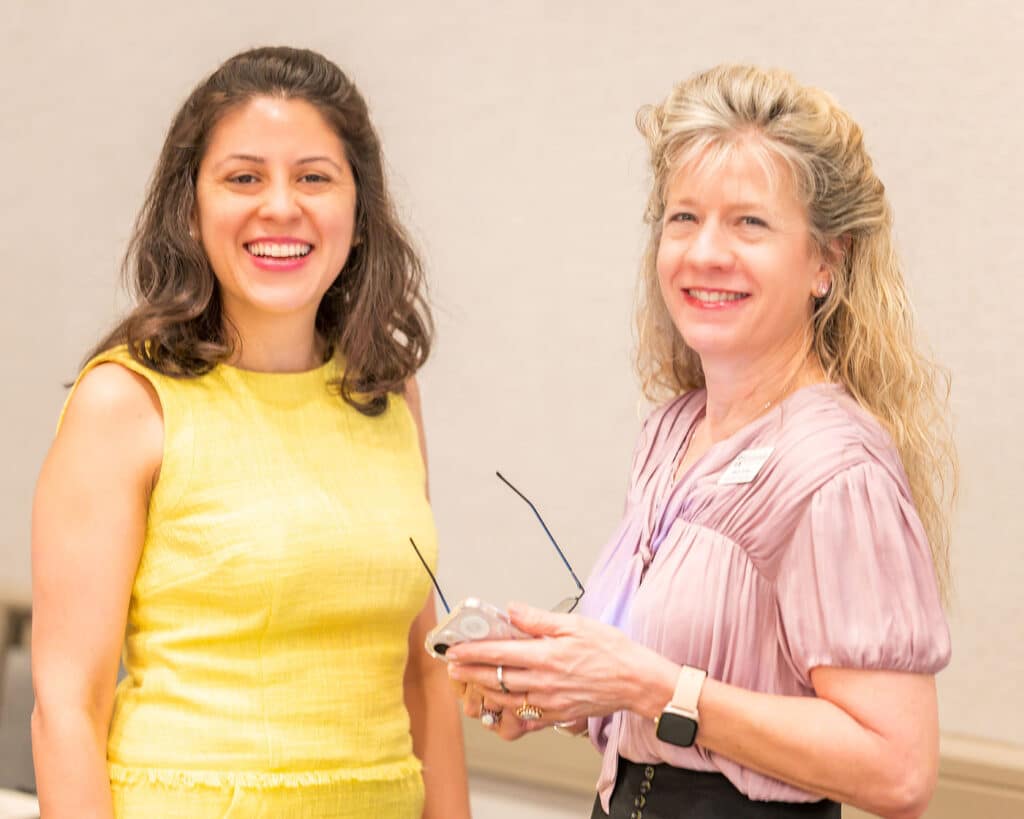
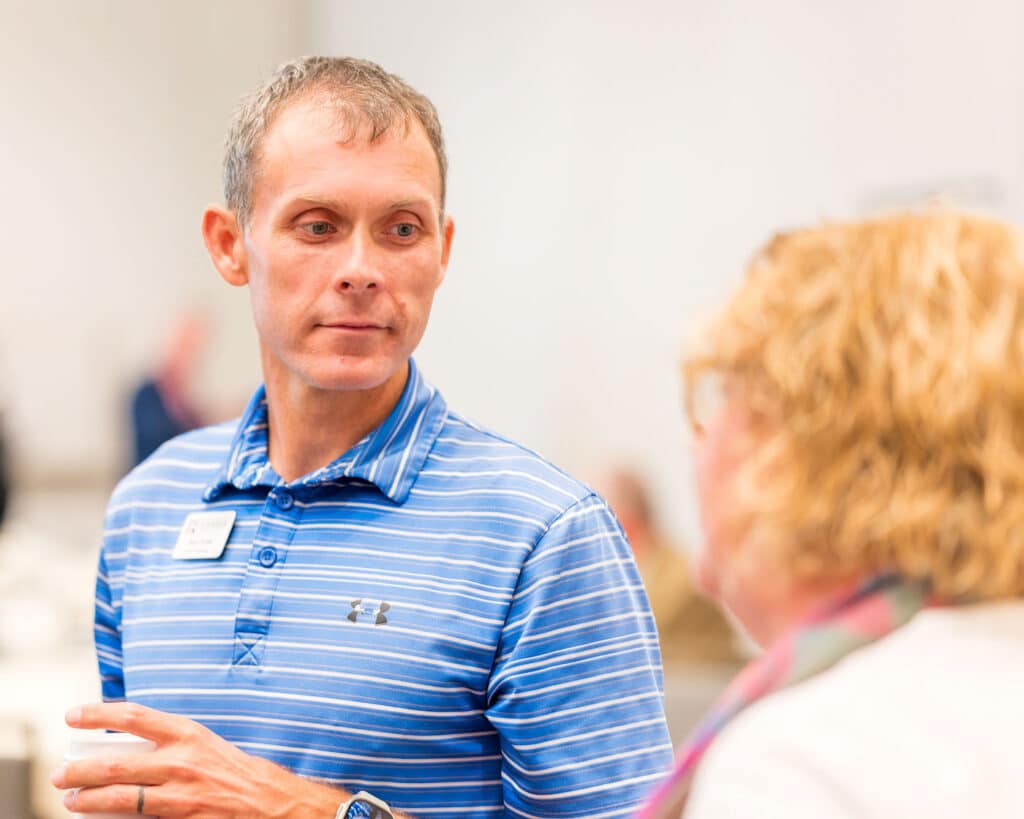
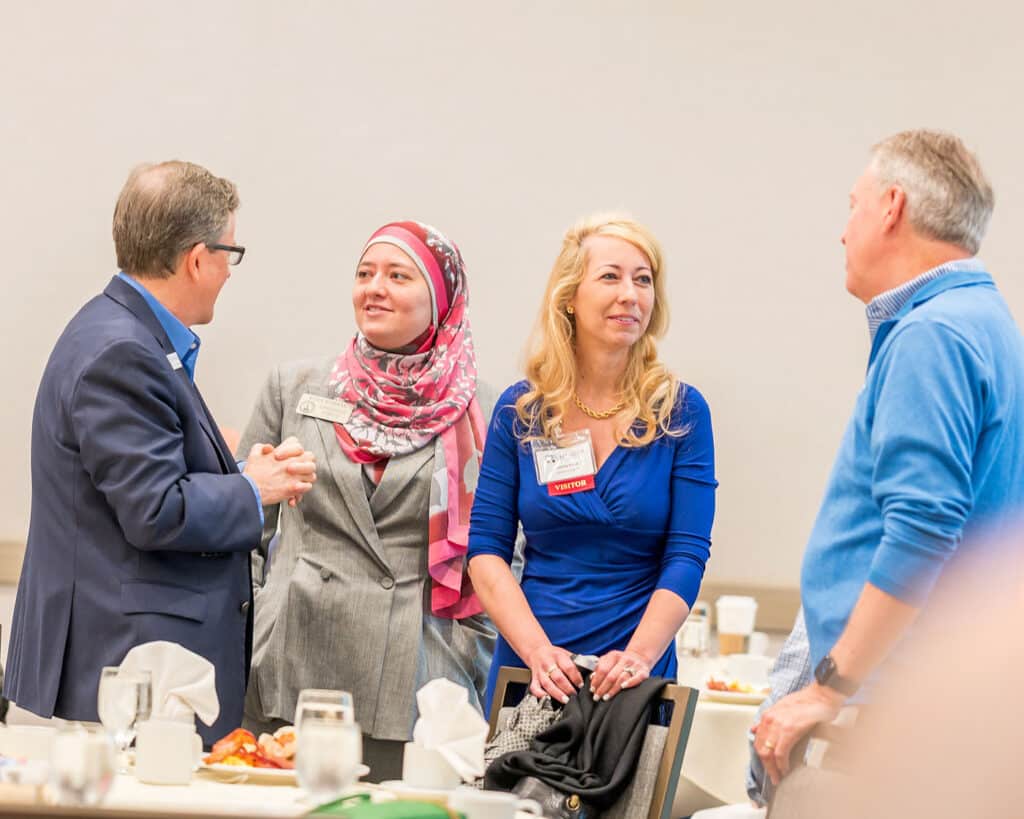
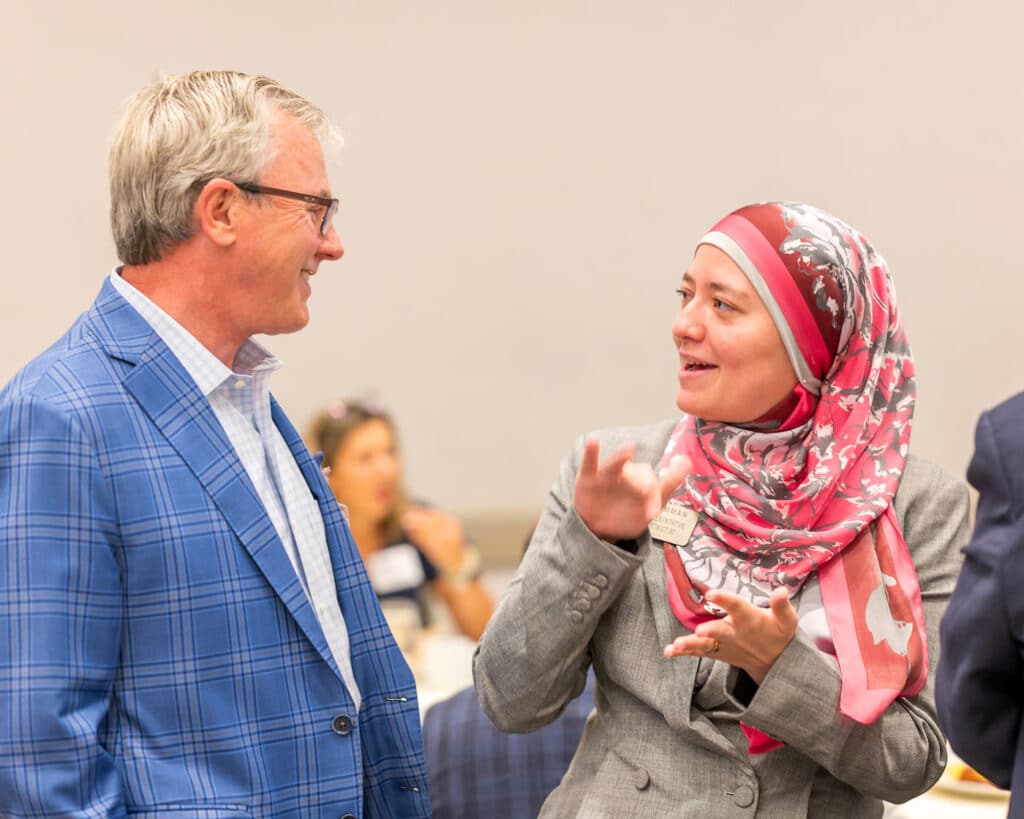
Business-related legislation
When the smoke cleared, both Hilton and Romman joked that they had different opinions about many issues but agreed that’s a healthy part of how the government works.
“The fact that we do disagree and the fact that you, the community, have varying choices and options out there. I think it’s a healthy part of the process,” said Hilton. “And we do have fun. I was telling somebody we play kickball about halfway through the session, and we do get along.”
The discussion moved on to topics such as the FTC ruling on non-compete clauses and tort reform, which just about everyone in the room agreed upon. Although employees could see the beauty of disallowing non-compete clauses, as business owners, they’d hate to see trade secrets put in jeopardy or valuable time and money put into training to benefit another company.
And everyone wanted to see caps on personal injury claims for things like slip-and-falls and fleet vehicle accidents.
“One of the few regrets I have coming out of session is that we didn’t do more on tort reform,” said Hilton. “Right now, Georgia is the number one judicial hellhole in the nation, meaning that we have more lawsuits on businesses and payouts than anywhere else in the country.”
This was one area where both representatives had similar views.
“I don’t think this is a left or right issue,” said Romman. “I want to make sure that whatever tort reform we pursue does not let, for example, a bad-acting company off the hook. But on the flip side, if somebody is just going around and suing everybody all the time to try and make some money off of it, how do you protect corporations and businesses from those kinds of bad incidents litigation?”
“What I will continue to look for when it comes to tort reform is, how are we going about balancing that?” she added.
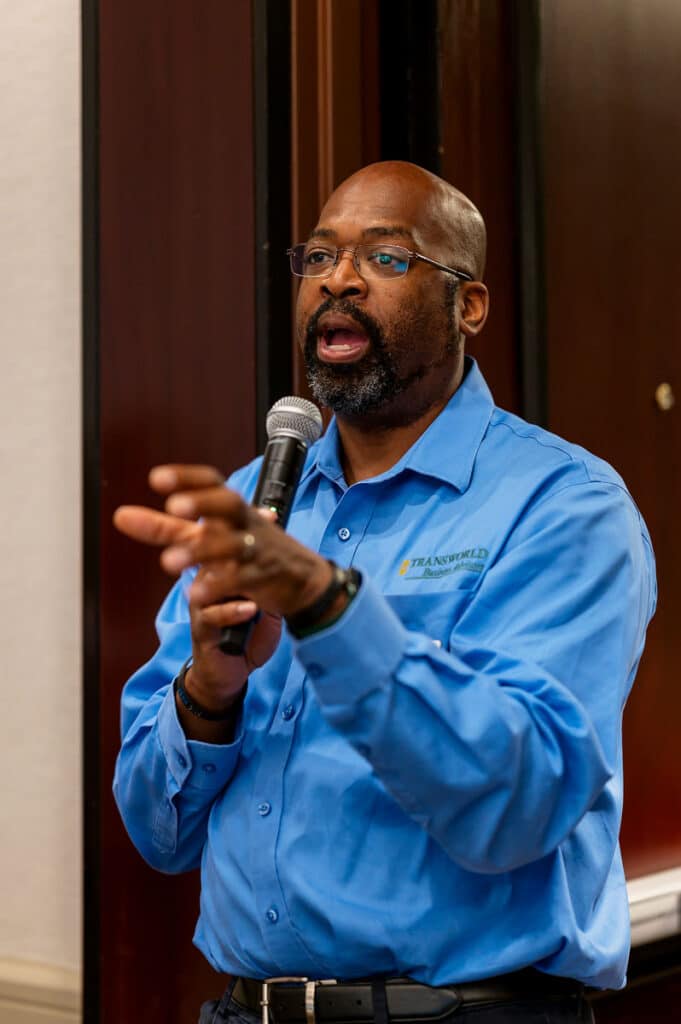
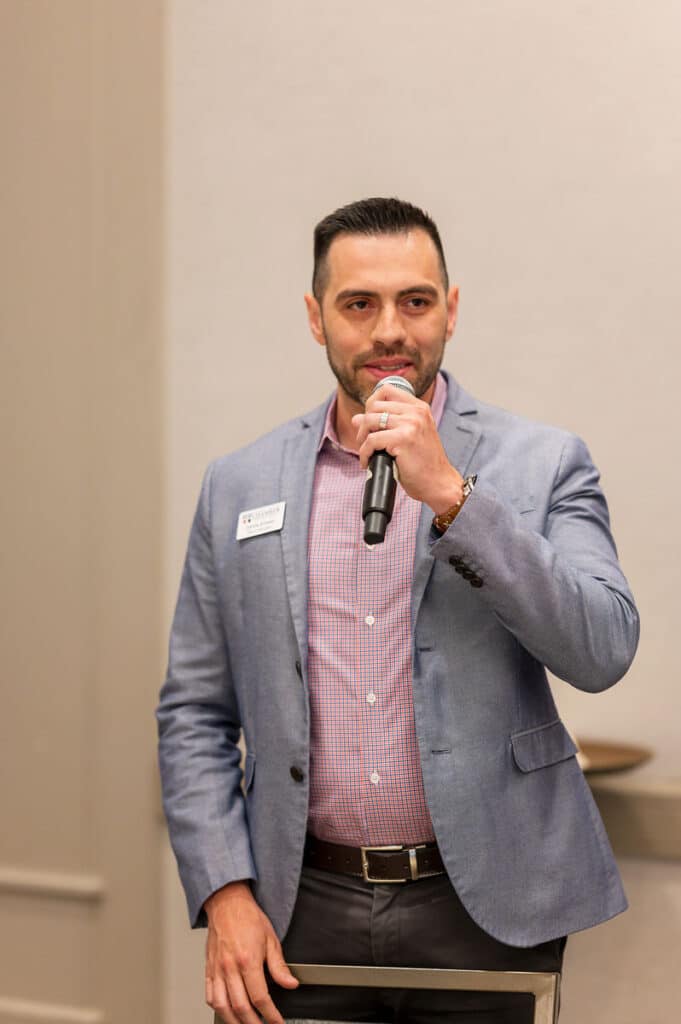
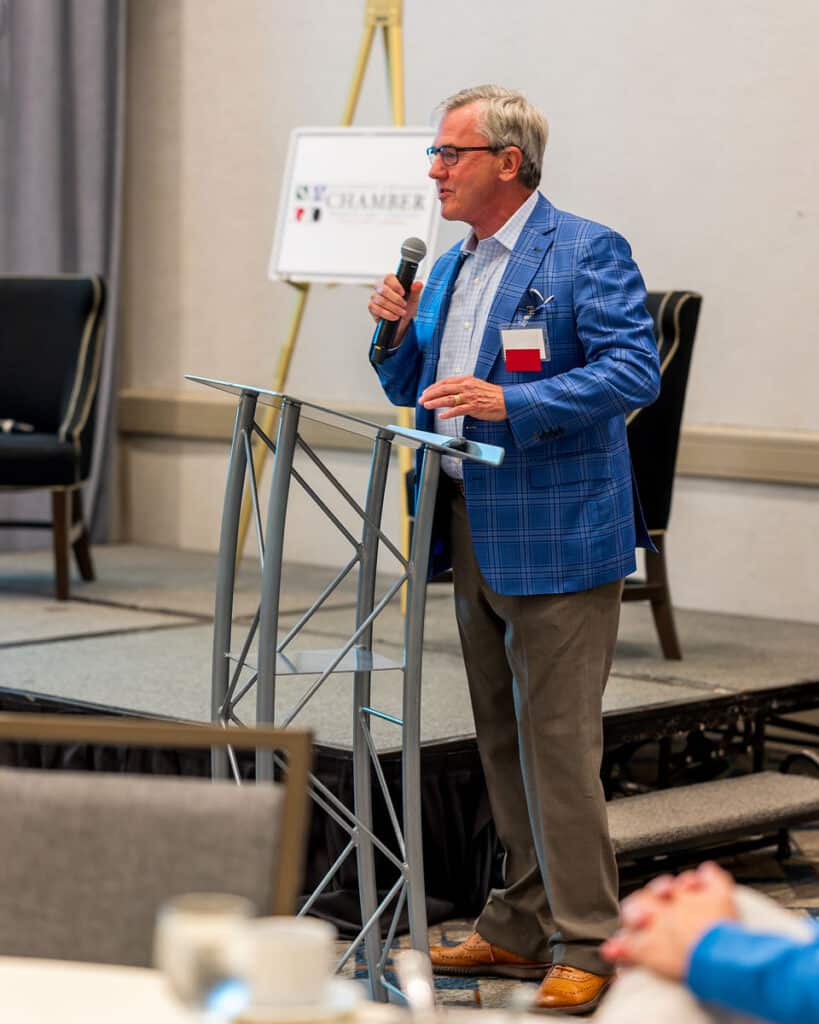
Looking ahead
As the session wrapped, Romman and Hilton pointed out legislation they’d like to see move forward next year.
“House Bill 971 creates a $300 tax credit for taxpayers who sign up for firearm safety training or purchase a safe storage device. It’s a bipartisan measure, viewed by some as a small but perhaps significant move for gun safety advocates, which was tabled in the Senate room,” said Romman.
She said the bill wouldn’t even require someone to disclose that they owned a firearm, but it was meant to incentivize people to store their firearms properly.
“There wasn’t a lot of appetite if somebody didn’t properly store their gun to have consequences for that, so we thought it would just incentivize better behavior,” she said.
Hilton mentioned school safety.
“Over the last three years, every single school in Georgia has gotten a one-time $100,000 grant for School Safety. That’s every school in Georgia; in this most recent budget, we included $45,000 in recurring money for every school in the state to do whatever they want to ensure their campuses are safe,” he said. This includes private schools as well.
At the end of the event, Hilton and Romman reminded the audience that they weren’t running against each other, and even though their views were different, their goals for a better Georgia were equally as passionate.
Related
Read the Digital Edition
Subscribe
Keep Up With Peachtree Corners News
Join our mailing list to receive the latest news and updates from our team.
You have Successfully Subscribed!

What’s going on at Jones Bridge Park and the Challenges of Urban Development

Taste of Peachtree Corners: PCBA Showcases Local Restaurants

The Forum Gives Sneak Peek of New Eateries and Community Spaces

Southwest Gwinnett Mayors Share Visions for the Future

8 Events Happening In and Around Peachtree Corners This August

Peachtree Corners Shines Bright with Light Up the Corners Glow Race this August

Peachtree Corners Shines Bright with Light Up the Corners Glow Race this August

The Forum Gives Sneak Peek of New Eateries and Community Spaces

8 Events Happening In and Around Peachtree Corners This August

Southwest Gwinnett Mayors Share Visions for the Future

Taste of Peachtree Corners: PCBA Showcases Local Restaurants

What’s going on at Jones Bridge Park and the Challenges of Urban Development

Local Resident Opens AtWork Location in Peachtree Corners

CHRIS 180 Expands its Services into Gwinnett County [Podcast]

Light up the Corners [Video]

Capitalist Sage: Business Leadership in Your Community [Podcast]

Cliff Bramble: A Culinary Adventure through Italy

Top 10 Brunch Places in Gwinnett County

A Hunger for Hospitality

THE CORNERS EPISODE 3 – BLAXICAN PART 1

Top 10 Indoor Things To Do This Winter

The ED Hour: What it takes to Remove Barriers from Education
Peachtree Corners Life
Topics and Categories
Trending
-
Business1 week ago
Taste of Peachtree Corners: PCBA Showcases Local Restaurants
-
Business2 days ago
The Forum Gives Sneak Peek of New Eateries and Community Spaces
-
City Government4 days ago
Southwest Gwinnett Mayors Share Visions for the Future
-
Around Atlanta4 days ago
8 Events Happening In and Around Peachtree Corners This August




